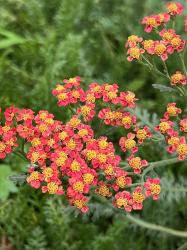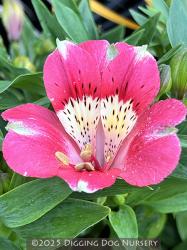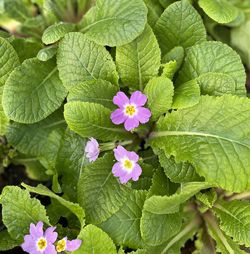Including Achillea, Aconitum, Alchemilla, Angelica, & Anemone
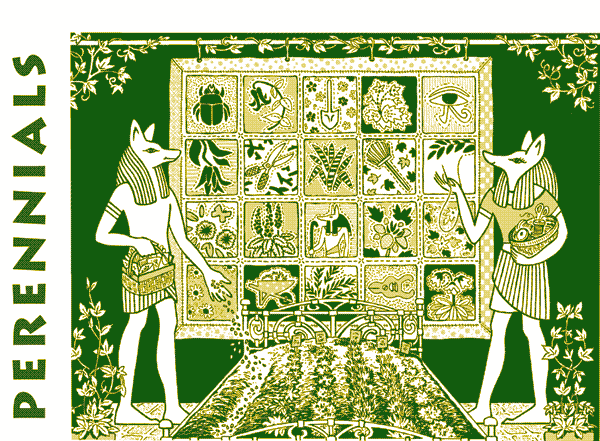
Perennials offer endlessly fascinating variety in terms of flower color, scent, foliage texture and hue, and overall form. In spring, the excitement begins as plants emerge, often rapidly attaining full size. This is a good time to fertilize. In summer, sit back and enjoy the bounty, remembering to deadhead and water.
We've tried to present a variety of perennials with fall blooming periods to extend summer's pleasure. In autumn we reevaluate and perhaps relocate. Winter dormancy is the right time to take divisions (usually every second or third year), increasing your collection and possibly a friend's.
One reason for noting a perennial's place of origin is to remind us that perennials are really wild flowers, and our garden unites the finest from meadows, mountains, and forests all around the globe. When planting, it's wise to combine plants with similar cultural needs, and then work within these guidelines for aesthetically pleasing combinations.
We hope our individual recommendations will help. Many of our perennials are varieties that are hard to find, and we think all of them are in some way outstanding.
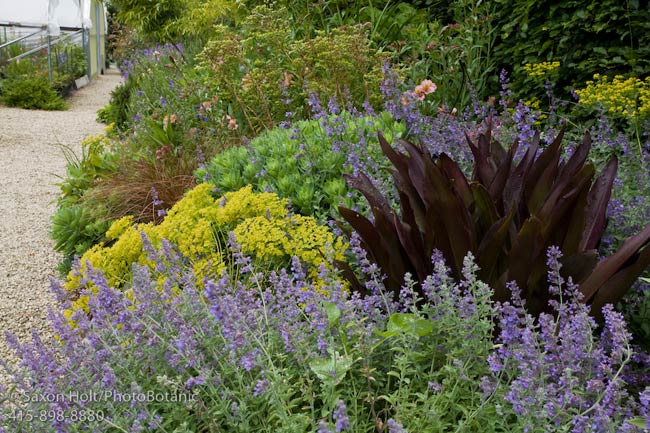
Acaena
Goose Leaf
Our selections of this enchanting, ground-hugging evergreen from New Zealand feature diminutive leaves with a ferny delicacy. Lifting on short stalks above the foliage, globe-shaped seed heads—small thornless “burrs”—are colored a brownish red. Adapted to almost any well drained location, plant it as a cover for your bulb bed, situate it along pathways, perch it on a garden wall or let it creep around paving stones.
Acaena inermis ‘Purpurea’ (P-1095)
Each $10.75
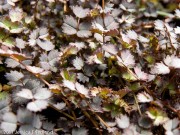
Colored in a purple-gray shade reminiscent of overripe plums, this enchanting ground-level evergreen from New Zealand sprouts delicate low-lying foliage that sends forth globe-shaped seed heads—small brownish red thornless spheres on short stalks. ‘Purpurea’ warmly interweaves a planting of Dianthus ‘Mendlesham Maid’, Scutellaria ‘Texas Rose’ and Carex glauca above our rock wall.
Blooms June–July.
Size: 6" high x 0" & spreading wide.
Hardy to zone 6.
Each $10.75
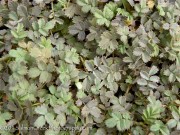
Pairs of tiny, scalloped silvery blue leaves and bronze trailing stems stay close to the ground, casting cool, fine textured accents on Sedum ‘Voodoo’s rich mahogany-red foliage or the glossy greenery of Dracocephalum ‘Fuji White’.
Blooms June–July.
Size: 6" high x 0" & spreading wide.
Hardy to zone 6.
Acanthus
Bear’s Breaches
Acanthus caroli-alexandri (P-1839)
OUT OF PRODUCTION AT THIS TIME
Email me when this plant is available
If you have always wanted an Acanthus but couldn't squeeze one into your garden, you'll be pleased to discover this compact smaller statured Bear's Breech. The pagoda-style tower of white and purple hooded flowers rises proudly from a textural, 18 in. tall lustrous rosette, fashioned with finely chiseled dark forest green leaves. Though Acanthus caroli-alexandri's origins are uncertain, some say it's a form of Acanthus hungaricus, while others claim it's a hybrid between Acanthus spinosus and Acanthus hirsutus its bold lacy accents are sure to turn heads in a tight spot or a more expansive planting.
Blooms June–July.
Size: 3' 0" – 4' 0" high x 2' 0" wide.
Hardy to zone 6.
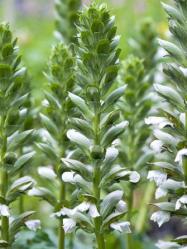
A lustrous mound of large, deeply lobed green leaves entertains majestic straight-up silvery green spires, composed of big pure white flowers that protrude from prominent canopy-like green bracts. With elegance and architecture to spare, this rarely offered perennial can be utilized as a statuesque pathway sentinel or as a compelling specimen in a mixed border. ‘Rue Ledan’ tolerates shade, wards off mildew and stays fresh in a cut arrangement for nearly 2 weeks.
Blooms June–July
Size: 3' 0" – 4' 0" high x 2' 0" – 2-1/2' wide.
Hardy to zone 7.
Acanthus ‘Morning′s Candle’ (P-2196)
Each $14.75
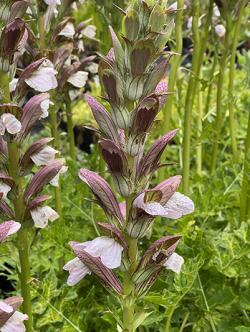
This majestic free-flowering Dutch introduction claims one known parent, Acanthus mollis, and two speculative parents, either Acanthus spinosus or Acanthus hungaricus. Ideal for fresh and dried arrangements, up to a dozen mighty spires muscle upwards with a stylish long-lasting display of hooded pure white flowers nestled amid prickly purple bracts. Varnished, deeply scalloped dark green leaves define the valiant compact clump, which makes a breathtaking specimen in mixed borders. Remaining evergreen where winters are mild, ‘Morning’s Candle’ withstands heat, dry periods, rabbits and deer.
Blooms June-July
Size: 3' 0" – 4' 0" high x 2' 0" – 3' 0" wide.
Hardy to zone 6.
Each $13.00
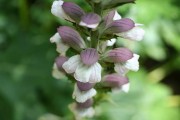
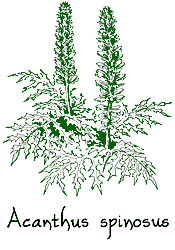
Hailing from the eastern Mediterranean, this bold statuesque perennial is as strong as a gladiator, and equally commanding. Held on lengthy stalks, the deeply divided, 2 to 3 ft. long leaves are glossy and very dark green. Spiny-looking, though not too sharp, the leaves’ erect yet arching architecture were the inspiration for the decorative crown on Corinthian capitals. Mysterious, 2 ft. tall wands of Foxglove-like flowers rise above the imposing mound. Long-lasting and excellent for arrangements, each white-lipped blossom is anchored by a green-gray bract and nearly hidden by a decorative, hood-like purple calyx.
Blooms June–July
Size: 3' 0" – 4' 0" high x 2' 0" – 3' 0" wide.
Hardy to zone 6.
Achillea
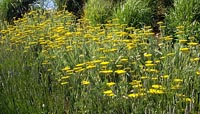
Yarrow
Legend has it that Achilles used this plant to heal his soldiers’ wounds after battle. As a folk remedy, its leaves are prescribed to soothe abrasions and toothache. We find this sturdy, dependable plant the perfect remedy for many design situations. The broad, flat flower heads project horizontal elements, their colors blending with other perennials. Spicy smelling, fern-like foliage and strong straight stems add to overall attractiveness. Spreading and drought tolerant, Yarrow seems to thrive on neglect, can handle ocean spray and will bloom again in the fall if cut back in midsummer.
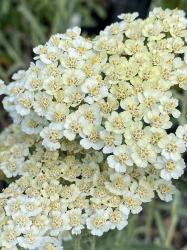
Named for the ivory-white color that the pale yellow flowers turn with age, ‘Alabaster’ blooms late and, with dried seed heads, keeps our interest well into winter. Its form is stiff and upright and its foliage gray-green, making an excellent neighbor for Aster ‘Little Carlow’ or grasses such as Miscanthus sinensis ‘Nippon’.
Blooms August–October.
Size: 2-1/2' high x 2' 0" wide.
Hardy to zone 4.
Achillea x ‘Coronation Gold’ (P-0002)
Each $11.75
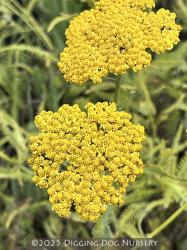
Throughout the summer, gray-green filigree textured foliage anticipates the autumn reveille. Planted in drifts, the flower heads, composed of tight clusters of tiny florets, form bold slabs of gold, a timely reflection of the harvest moon. Contrast this tall growing Yarrow with Eupatorium purpureum.
Blooms June–July.
Size: 3' 0" high x 2' 0" wide.
Hardy to zone 4.
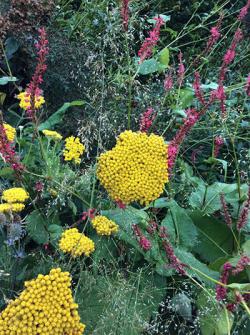
A well-loved garden mainstay, this steadfast AGM recipient features dense golden floral plates, rising like harvest moons, on stout upright leafy stems above a handsome pewter-green mound of deeply dissected aromatic foliage. Grateful for lean somewhat dry sites, ‘Parker’s Variety’ asserts a regal stature and richly colored corymbs with complementary accents amid blue-flowering neighbors such as Salvia ‘Nekan’ or Agapanthus ‘Back in Black’.
Blooms June-August
Size: 3' 0" – 4' 0" high x 18" wide.
Hardy to zone 3.
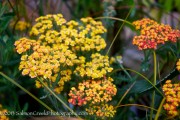
With imposing clusters of fire engine red flowers heightened by prominent saffron yellow eyes and a strong, self-supporting stance, this preeminent German-bred Yarrow has a lot to offer.
Arising from airy and finely cut, grayish green foliage, its stiff, upright stems shoulder a fervid fiesta that continues for months as the blooms age to soft apricot and toasty orange shades, then finally to hushed golden tones.
Blooms June-early August.
Size: 2' 0" – 3' 0" high x 2' 0" wide.
Hardy to zone 4.
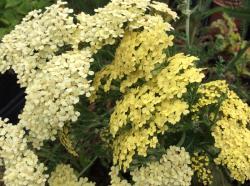
In clear creamy-lemon hues, the large flattened umbels are lifted on short, firm leafy stems above a lace-like delicacy of green foliage. Later to bloom and not as tall as most of our other Achillea offerings, this softly colored AGM winner is an exemplary choice for smaller gardens, given border frontage and Aster ‘Twilight’ as a companion.
Blooms August–October
Size: 15" high x 15" wide.
Hardy to zone 4.
OUT OF PRODUCTION AT THIS TIME
Email me when this plant is available
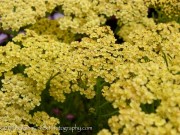
A stalwart old favorite, ‘Hoffnung’ has proven itself to be a strong performer, faithfully producing fuzzy, feathered iron-green millefolium foliage and pale apricot-colored flowers that fade to a creamy-yellow. Pair it with Lavandula ‘Peter Pan’ for complementary bloom color.
Blooms July–September
Size: 2' 0" high x 2' 0" wide.
Hardy to zone 4.
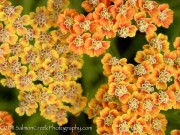
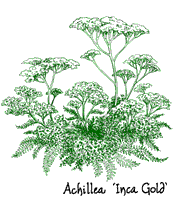
This truly architectural Yarrow blooms on three different levels. Flowers, ranging in color from rust to sandstone, unfurl from terracotta buds at 16, 24 and 30 in. upon a backdrop of cool green fern-like leaves and erect stalks. ‘Inca Gold’ mixes well with the scented foliage of Agastache ‘Tango’ or the cream-colored flowers of Anthemis ‘Susanna Mitchell’.
Blooms early July–early October
Size: 3' 0" high x 2' 0" wide.
Hardy to zone 4.
OUT OF PRODUCTION AT THIS TIME
Email me when this plant is available
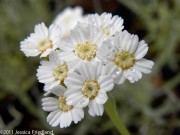
The silver-gray filigree foliage, sturdy, upright flower stalks and abundant yellow-centered white flowers combine to give this attractive hybrid a crisp, refreshing look. Even on our windy coast, it remains steadfast and lively. In the rock garden, en masse, or contrasted with the bronze blades of Stipa arundinacea or the deep green foliage of Dracocephalum ‘Fuji Blue’, this plant will quickly become a favorite.
Blooms May – September
Size: 8" high x 8" wide.
Hardy to zone 5.
Each $11.75
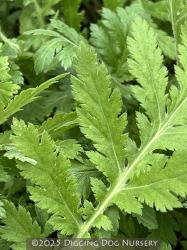
Classified by Linnaeus in 1753, this distinctive, seldom-offered Yarrow is still gracing today’s gardens with bold leafy texture. Fern-like, coarsely-divided vibrant green foliage cloaks numerous tall, upright sturdy stalks, while eluding bunnies and deer. Indigenous to various regions throughout central Europe, Large-Leaf Yarrow’s vigorous habit lifts flattened luminous clusters of small white blooms defined by recurved petals plus butter-hued centers that beckon bees and butterflies. No-quibble Achillea macrophylla wafts a heady scent, makes a superb cut flower, fresh or dried, and renders a striking bushy specimen when set against fine-hewn partners like ornamental grasses and Asters or Sanguisorbas in sunny mixed borders, cottage gardens and meadow-style plantings.
Blooms July–September
Size: 3' 0" high x 2' 0" wide.
Hardy to zone 6.
Each $11.75
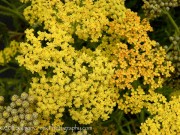
Just hearing this warm-colored Achillea’s name conjures a sweet and satisfying image. Finely cut, grayish green foliage offsets paprika-toned buds and thick slices of small, individual old-gold florets. Position ‘Marmalade’ next to Kniphofia caulescens and Nepeta ‘Joanna Reed’ so you can indulge in its cozy autumnal shades.
Blooms July–October
Size: 2-1/2' – 3' 0" high x 2' 0" wide.
Hardy to zone 4.
Achillea millefolium ‘Pretty Belinda’ (P-1738)
Each $11.75
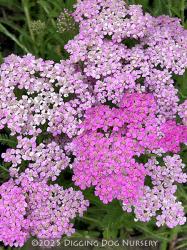
‘Pretty Belinda’ struts lovely flat-topped dense flower clusters in vibrant lilac and pink hues on steady straight stems. Finely incised feather-like foliage cloaks an aromatic tidy green foundation that is more compact, more upright and shorter than most millefolium cultivars. This long summer bloomer won’t need staking, entices butterflies and brings colorful good looks to Lavenders, Geum ‘Mango Lassi’ and Salvia ‘Sweet Esmeralda’.
Blooms June–September.
Size: 18" – 2' 0" high x 18" – 2' 0" wide.
Hardy to zone 4.
Achillea millefolium ‘Red Velvet’ (P-1739)
Each $11.75
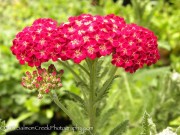
Applauded as the best of the red Achilleas, this Yarrow’s signature is its splendid horizontal mass of velvet-rich, dark rosy-red flowers. Tall resilient stalks clad in fine textured gray-green foliage bolster full flashy heads that last all summer and refuse to fade. Dutch-bred ‘Red Velvet’ can harmonize with Sanguisorba ‘Red Thunder’ and Monarda ‘Jacob Cline’ for sumptuous color echoes.
Blooms June–September
Size: 2-1/2' high x 2-1/2' wide.
Hardy to zone 4.
Achillea ‘Mondpagode’ (P-1239)
OUT OF PRODUCTION AT THIS TIME
Email me when this plant is available
For its dense, sizeable heads of elegantly layered, bright creamy white flowers, this sterling Achillea earns the namesake ‘Moon Pagoda’. Never fading to murky grays, the bold display opens from soft yellow buds supported by strong, branching stems and a green base.
Straight-up ‘Mondpagode’ is a highly touted, AGM victor that always behaves, and dignifies the border with Sedum ‘Matrona’ by its side.
Blooms September–October.
Size: 2' 0" high x 2' 0" wide.
Hardy to zone 4.
Each $11.75
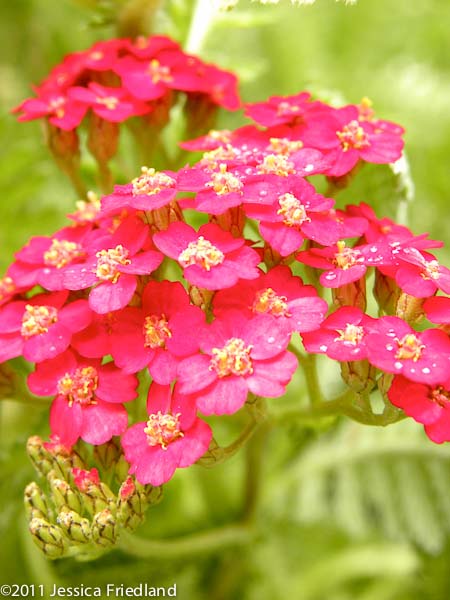
Similar to the seasoning, this vigorous Galaxy hybrid flavors the garden with a distinctive red snappiness. The large flattened heads showcase gilded eyes, their bright rubescent coloring eventually fading to a deep pink hue, while delicate-looking green-gray foliage provides a tidy tranquil counterpoint. Persicaria ‘Golden Arrow’ heightens the recipe.
Blooms June–September
Size: 2' 0" high x 2-1/2' wide.
Hardy to zone 4.
Each $11.75
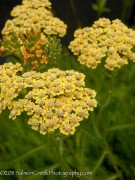
A tasteful gray-green foundation of airy, fine-textured foliage furnishes russet-tinted buds, which are held in dense flat flower heads. Eventually paling to soft yellow, the earthy orange hues turn on the heat for Campanula ‘Prichard’s Variety’s cool violet-blues in our garden.
Blooms July–September
Size: 2-1/2' high x 2' 0" wide.
Hardy to zone 4.
Achillea x schwellenberg (P-1869)
Each $11.75
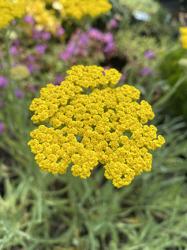
This hard working hybrid Yarrow has plenty to brag about: dazzling deep golden flower heads wielded atop an upstanding, compact bushy foundation of handsomely arranged stalks and delicate-looking feather fine silver-green foliage. Springing from an Achillea filipendulina and Achillea ptarmica cross that was introduced in 1987 by Longwood Gardens in collaboration with the National Arboretum, Achillea x schwellenberg proposes additional attributes such as copious blooms, no self-seeding and enough pluck to thrive just about anywhere, including the humid southeast.
Blooms June–August
Size: 18" high x 18" – 2' 0" wide.
Hardy to zone 3.
Achillea ‘Taygetea (cream form)’ (P-1684)
Each $11.75
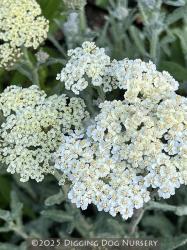
Making its way from the Middle East to England in 1640, this refined form first caught our eye at Bernwode Plants, a small nursery in England.Making its way from the Middle East to England in 1640, this refined form first caught our eye at Bernwode Plants, a small nursery in England.
Large finely feathered broad leaves, bathed in hushed silvery greens, compose a sturdy well-groomed clump that looks impeccable all season. Luminous umbels of clustered pale cream flowers bloom later and longer than most Yarrows, affording a welcome place for the eye to rest amid the lush greens and more boisterous blooms associated with summer.
Blooms July–September.
Size: 18" high x 18" – 2' 0" wide.
Hardy to zone 4.
Achillea tomentosa ‘Aurea’ (P-1603)
OUT OF PRODUCTION AT THIS TIME
Email me when this plant is available
Woolly, narrow, and finely feathered, small gray-green leaves knit a tidy, low growing mat that is both attractive and extremely drought tolerant. Tightset, flat clusters of perky lemon yellow flowers perch on 6 to 10 in. stems above dense soft-looking foliage. Championed as a choice candidate for clambering about the rockery, filling in small crannies, or edging a path, this tenacious charmer can pal around with Scutellaria ‘Texas Rose’, though it resents hot humid weather.
Blooms June–August.
Size: 6" high x 10" wide.
Hardy to zone 4.
Achillea tomentosa ‘King Edward’ (P-0158)
Each $11.75
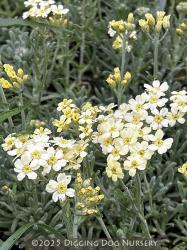
This aromatic AGM champ develops a neat slow-spreading mat of prostrate stems clad in slim, finely dissected green leaves with tiny white hairs. Cherished by bees and butterflies, adorable small primrose-yellow flowers alight slender 6 in. stems rising above the wooly close-set evergreen carpet that imparts silver highlights. ‘King Edward’ can be lodged between pavers or steps, nestled amongst rocks, snugged along sunny pathways and tucked into containers, where its stalwart spirit braves dry conditions and poor sandy soil, but begs adequate air circulation plus good drainage.
Blooms June–August
Size: 6" – 8" high x 10" – 12" wide.
Zone b/4.
Achillea ‘Walther Funcke’ (P-0502)
Each $11.75
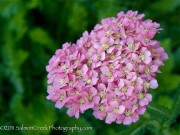
A cozy mélange of buff, creamy rose and deep antique pink distinguishes this lovely cultivar named after the German river that flows to the North Sea. Atop deeply feathered green leaves and staunch stems, the multicolored display is marked by light centered individual florets, lending a feminine flair to companions like Aster ‘Lutetia’ or Eryngium ‘Blaukappe’.
Blooms July – September.
Size: 2' 0" high x 15" – 18" wide.
Hardy to zone 4.
Aconitum
Monkshood
First cultivated in the mid-1500s, Aconitum derivatives were used as both a medicine and a poison, and an unwanted husband might have easily met his end while drinking his dear wife’s tonic. Simply medieval! Leaves, stems and roots are poisonous, but the stately Aconitum still deserves a place in our gardens because of the unusual blooms it hoists in abundance on stalwart stems. An excellent cut flower, unique for its large draped sepal, Aconitum loves cool summer nights, moist, but not wet soil and protection from the heat of the day. Perfect in the border or at woodland’s edge, their bold presence makes an engaging companion to Anemone, Helenium and late-blooming Persicaria.
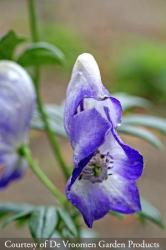
A bushy forest-green foundation of lustrous deeply-fingered foliage plus staunch wide-branching stems bolsters the unique bicolored blooms. Coveted by pollinators, floral designers and plantspeople alike, this supposed Aconitum variegatum and Aconitum nepellus descendant premiers tall scene-stealing spires, housing copious, close-set hooded white flowers toned with soft blue hues and indigo-violet edges. ‘Bicolor’ boasts first-rate AGM notoriety for its stately vertical profile and midseason blooms that illuminate plants such as Phlox ‘Gzhel’ and Heracleum ‘Pink Cloud’.
Blooms July–August
Size: 3' 0" – 4' 0" high x 18" – 2' 0" wide.
Hardy to zone 3.
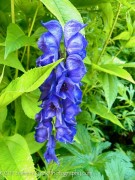
A stockier, noble cultivar that doesn’t need staking, this Aconitum’s deep blue-violet spires are narrow and tapered. Helmet-like flowers line the straight, sturdy stems, each central shaft first showing color, than the side spikes following suit. Anchored by a compact, bushy mass of polished and narrowly-fingered dark greenery, ‘Bressingham Spire’s cool-colored floral display soothes Centaurea macrocephala’s sun-struck blooms.
Blooms June–August
Size: 2' 0" – 3' 0" high x 18" wide.
Hardy to zone 4.
Aconitum x cammarum ‘Eleonora’ (P-1787)
OUT OF PRODUCTION AT THIS TIME
Email me when this plant is available
A captivating departure from our solid-hued Monkshood selections, 'Eleonora' offers pretty bicolored creamy white helmet-style blooms ornamented with delicate violet-blue edges on openly branched terminal panicles. The intensely segmented, deep green leaves are smooth and shiny, and tend to be lax at the base before climbing steadfast straight-backed stems, while the light-colored flowers look their best when showcased against a dark foil.
Blooms June–August
Size: 3-1/4' high x 18" wide.
Hardy to zone 4.
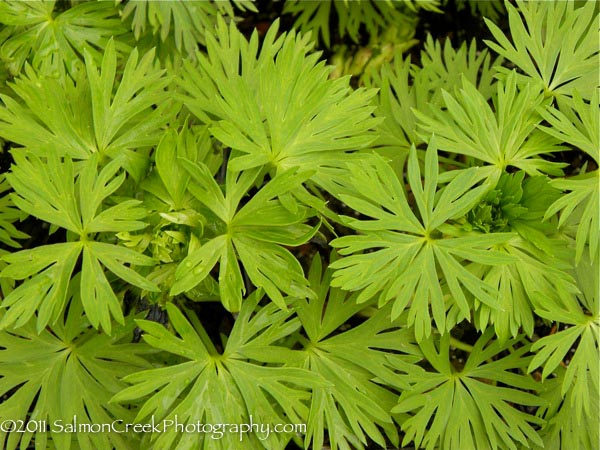
Lavish steel-blue steeples are the great reward of this easy-to-cultivate perennial. Cloaking firm stems, the glossy grayish green foliage is deeply divided into slender fingers. Thalictrum ‘Elin’s delicate leaves and lavender flowers are a satisfying touch next to smoky-hued ‘Stainless Steel’.
Blooms mid June–August
Size: 3-1/2' high x 18" wide.
Hardy to zone 4.
Aconitum carmichaelii ‘Arendsii’ (P-0820)
Each $14.50
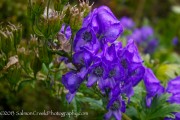
For this choice cut flower’s plentiful show of large, vivid azure-violet blooms embellishing tall spikes, and its vigorous stature, many gardeners consider ‘Arendsii’ to be among the best of the late-flowering Aconitums. Broadly segmented, deep green leaves have a lustrous, leathery quality. Plant Kniphofia ‘Tawny King’ nearby and enjoy a late summer splash of color.
Blooms July–early October
Size: 3-1/2' high x 18" wide.
Hardy to zone 4.
Each $14.50
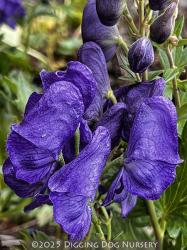
This compelling Chinese denizen has a lot to offer: unyielding medium-sized stature that never needs staking, gleaming verdant foliage and crystal clear late season bloom. Populating stiff dark blue-violet spires, the hood-shaped flowers surmount ramrod straight stems wrapped in triclefted green leaves, each further carved by stylish lobes and toothed edges. Aconitum fischeri’s dignified persona is ideal, either for a midborder position flanked with Phlox ‘David’ or a more naturalized setting surrounded by Muhlenbergia reverchonii ‘Undaunted’™.
Blooms August–early October
Size: 2' 0" – 3' 0" high x 12" – 18" wide.
Hardy to zone 4.
Aconitum henryi ‘Sparks Variety’ (P-1788)
Each $14.50
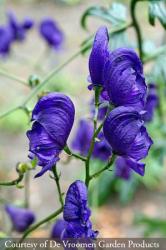
Intense dark indigo-blue hooded blooms densely garnish a unique presentation of lovely large and wide-branching panicles, without the distraction of a dominant central leader. Strong, lean tapered stalks and deeply cut, varnished forest-green foliage bolster a flowery spectacle that tantalizes the floral trade and keeps our attention sparked through late summer with its masterful seed pod-studded stems. Steeped in grandeur since 1898, when legendary plantsman Maurice Prichard first introduced it, this AGM winning Aconitum can be mingled amongst dusky-colored blossoms or the bright yellows of Helianthus ‘Capenoch Star’.
Blooms August-September
Size: 3' 0" – 4' 0" high x 18" wide.
Hardy to zone 3.
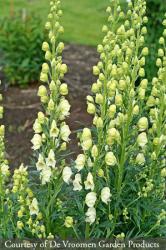
Native to the moist meadows and mountainous areas of Europe and Asia, this choice architectural cultivar muscles straight, burly stalks that don’t need to be staked. Ideal in cut arrangements, the towering pollinator-friendly spires are bedecked with luminous hooded white flowers above a polished, ferny foil of deep-hewn, dark emerald-colored foliage. ‘Album’s artful refinement plus easy-to-blend, refreshing colors are the perfect antidote for a hot summer day.
Blooms July–September
Size: 3' 0" – 4' 0" high x 12" – 15" wide.
Zone 3/4.
Acclaimed for its straight tightly clustered racemes of navy-blue flowers, this beloved old Irish cultivar boasts a well-earned AGM plus an early summer bloom time. Lustrous deeply-fingered dark greenery attires lengthy staunch stems beneath the spectacular full-toned blooms. A choice addition to mixed borders, woodland gardens or cut arrangements, ‘Newry Blue’ partners well with Sanguisorba ‘Burr Blanc’ and Actaea ‘Queen of Sheba’.
Blooms July–September
Size: 4' 0" – 5' 0" high x 12" – 15" wide.
Zone 3/4.
Aconitum septentrionale ‘Ivorine’ (P-1683)
OUT OF PRODUCTION AT THIS TIME
Email me when this plant is available
Strong steeplelike stalks elegantly showcase hooded, close-set ivory white flowers on branching stems. A cool classic look is achieved when illuminated blossoms unfurl above an urbane bushy clump of gleaming deeply lobed, dark green leaves.
One of the first Aconitums to bloom, this 1958 Alan Bloom selection can be affiliated with other beauties such as Phlomis ‘Amazone’ and Heuchera ‘Wendy’.
Zone 3/4.
Blooms May–June
Size: 2' 0" – 3' 0" high x 12" – 15" wide.
Zone 3/4.
Actaea
Black Snakeroot
A botanical “Renaissance Man,” Actaea is at home in an informal garden, a refined border or in an arrangement for opening night at the Met. Their ambrosial perfume floats through the air as they illuminate their surroundings. Actaea is happiest in moist, humus-enriched soil and bright shade; otherwise it’s carefree and low maintenance.
OUT OF PRODUCTION AT THIS TIME
Email me when this plant is available
An 1805 discovery by German-born Frederick Pursh in the Appalachian Mountains of Virginia and North Carolina, this superb hard-to-find American native sprouts broad ample-sized foliage, distinctive for its handsome Maple-like appearance. Straight emerald-hued steadfast stems, bearing fragrant creamy white floral candles, tower above a leafy verdant clump. Appalachian Bugbane can be ensconced near Athyrium 'Ghost', where it vows luminous late season accents, deer resistance and easy care.
Blooms July–September
Size: 4' 0" – 4-1/2' high x 2' 0" – 2-1/2' wide.
Hardy to zone 4.
Actaea japonica ‘Cheju-Do’ (P-1871)
Each $14.75
A superior South Korean selection introduced by Darrell Probst, this courtly compact Actaea furnishes lush verdant layers of jagged-edged, shiny green leaves clasping blackish purple stalks. The dark pearl-shaped buds plus tiny snow-white blossoms adorn tall close-set glittering candles that gracefully herald the season’s end.
Blooms August–September
Size: 3' 0" – 4' 0" high x 18" – 2' 0" wide.
Hardy to zone 4.
Actaea pachypoda ‘Misty Blue’ (P-1789)
OUT OF PRODUCTION AT THIS TIME
Email me when this plant is available
Promising three season appeal for the woodland garden, this marvelous soft-looking East coast native is a Dr. Richard Lighty selection from Delaware’s esteemed Mt. Cuba Center. Its handsome glaucous clump of finely cut silvery blue-green foliage hosts small starburst-like creamy white blooms on short stalks in spring and several months later, wondrous round white berries, each tattooed with a distinctive black spot at the tip and poised upon a striking bright red pedicel. Long-lived White Baneberry crafts an exceptional multistemmed ground cover that favors moist well-drained soil.
Size: 2' 0" – 3' 0" high x 2' 0" – 3' 0" wide.
Zone 3/4.
Actaea ‘Queen of Sheba’ (P-2215)
Each $18.75
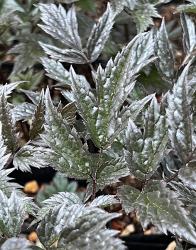
A sensational Piet Oudolf hybrid, this Actaea simplex and Actaea racemosa cross showcases the best traits of both parents. Gleaming, irregularly-toothed maple-like foliage sculpts a posh deep bronzy-purple mound beneath tall slender upstanding dark stems and an elegant scented gathering of long, pendulous finger-like white racemes. Eventually mellowing to a plum-imbued green, ‘Queen of Sheba’ tantalizes pollinators plus adores dappled light, enriched soil and adequate moisture. She makes a royal companion for Epimediums or Pulmonarias. (pp#21,727)
Blooms August–October
Size: 5' 0" high x 2' 0" wide.
Hardy to zone 4.
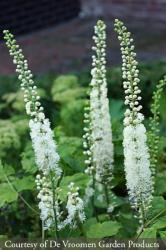
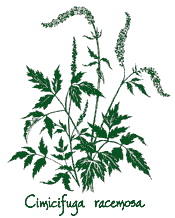
Long wand-like creamy-white racemes dangle and dance on slender stems above clumps of dapper deeply-cut toothed green foliage. Try this princely AGM recipient in a naturalized setting, under a tall canopy at the back of the border, next to leafy Ligularia.
Blooms July–August
Size: 5' 0" – 6' 0" high x 2' 0" – 3' 0" wide.
Zone 3/4.
Brimming with elegance, this compact dark-hued perennial pays homage to the British horticulturist, who extensively researched this genera’s DNA. Astilbe-style, nearly black and bronzed matte- green leaves attire sleek, lanky, midnight-purple stalks beneath spherical deep plum-hued buds and a perfumed showing of long, fluffy white cylinders, donning occasional pink tinges. Guaranteed to lend dashing lacy accents, this straight-backed perennial can linger behind Astilbe.
Blooms August–September
Size: 5' 0" – 6' 0" high x 2' 0" – 3' 0" wide.
Zone 3/4.
Actaea simplex ‘Atropurpurea’ (p-0049)
Each $14.75
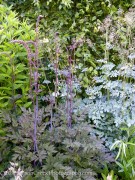
Grown from seedlings carefully selected for dark, coppery-purple foliage, the regal profile of ‘Atropurpurea’ shows its good breeding. A garden dweller with a stately bearing, its sturdy reddish purple stems soar above your head, displaying dense spires covered with round mahogany-hued buds and sweet pouffes of white. Echo this Actaea’s somber tones by bringing it together with Angelica gigas, and let the lime-green foliage of Choisya ‘Limo’ lighten the mood.
Blooms August–September
Size: 6' 0" high x 2' 0" – 3' 0" wide.
Zone 3/4.
Actaea simplex ‘Brunette’ (P-0811)
Each $16.75
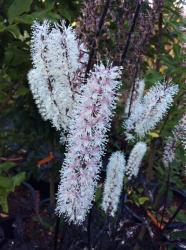
Noted around town for her purple-black leaves and stems, ‘Brunette’ is sure to turn some heads with her graceful fern-like foliage. At the back of the border, amidst the chaos of summertime greenery, this dark lady’s shadow lolls long before offering up arching racemes of fragrant, slightly blushed white flowers. One of the most sought-after cultivars, ‘Brunette’ is another lovely dark foliage selection of Actaea simplex seedlings.
Blooms August–September
Size: 5' 0" – 6' 0" high x 2' 0" – 3' 0" wide.
Zone 3/4.
Actaea simplex ‘Pink Spike’ (P-1427)
Each $18.25
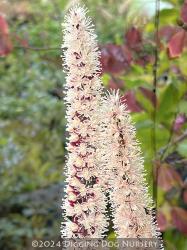
Lofty, lean raisin-colored stems culminate in long honey-scented pale pink spires stretching skyward above a refined, Ariel-like mass of sumptuous, serrated chocolaty-purple foliage. This coveted garden aristocrat casts a decidedly feminine aspect on Geranium maculatum ‘Espresso’s coffee-hued leaves.
Blooms August–October
Size: 5' 0" high x 2' 0" – 2-1/2' wide.
Zone 3/4.
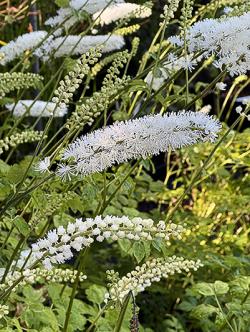
Surprisingly under used, ‘White Pearl’s bright white, bottlebrush-shaped blossoms and large pearly buds will light up a dark setting just like the animated glow of a 4th of July sparkler. Good-sized perfumed flowers unfurl later than most other Actaeas, while their densely set stalks are more arching than Actaea racemosa. Tolerating drier, less rich sites, the deceptively tough wiry stems and finely cut, toothed foliage compose a nimble-looking medium green stand that slowly spreads.
Blooms September–October
Size: 4' 0" high x 2-1/2' wide.
Zone 3/4.
Agapanthus
Lily of the Nile
Seducing gardeners and hummingbirds, Agapanthus hails from South Africa and procures its name from the Greek words agape and anthos meaning ‘love flower.’ Well-draining, not-too-rich, loamy soil, afternoon shade where it’s hot and protection from cold winter nights ensure a happy specimen that even obliges an occasional dry period once established.
Eye-catching contrast, darkly colored late season blooms and a shorter steadfast stature are the attributes of this prized 2005 introduction by Dutch plantsman Piet Zonneveld. Umbrella-shaped, deep bluish purple flowers crown stout, polished upright green stalks infused with lavish jet-black shades as they mature. ‘Back in Black’s seductive midnight hues forge a stunning juxtaposition against the tidy glistening clump of strapping green leaves. (PP#16,244)
Blooms July–September
Size: 2' 0" high x 18" wide.
Zone 6b.
Agapanthus ‘Black Buddhist’ (P-2217)
Each $15.75
Touted as one of the deepest hued flowering cultivars in the genus, the compact no-fuss visage mesmerizes us with upright hefty midnight-blue stems and exotic-looking floral globes. This versatile pollinator-friendly perennial unleashes lustrous strap-like emerald-green foliage beneath large clustered blooms, each featuring inky-purple buds plus funnel-shaped, vivid indigo-violet flowers marked by darker central stripes. Well suited for mixed borders, massed plantings, containers and cut arrangements,‘Black Buddhist’ snubs bunnies and deer, cherishes fertile well-drained soil and needs protection from cold winter weather.
Blooms July–September
Size: 2-1/2' – 3' 0" high x 18" – 2' 0" wide.
Zone 7b.
Agapanthus ‘Lilliput’ (P-1602)
Each $14.50
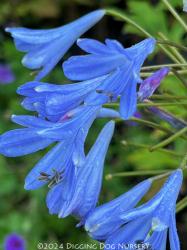
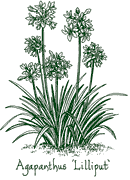
A glossy green fountain of low growing, straplike evergreen foliage offers up loosely arranged round umbels, which unfurl like exploding fireworks, atop sturdy leafless stalks. Violet anthers and deep purple stems augment the cool dark blue, tubular flowers. Well-suited for a container or the front lines of a bed amid silver-leafed plants, small-statured ‘Lilliput’ thrives in well draining, not-too-rich, loamy soils, withstanding some dry periods once established. It appreciates afternoon shade where it’s hot and winter protection from the cold.
Blooms July – September.
Size: 2' 0" high x 18" wide.
Zone 7/8.
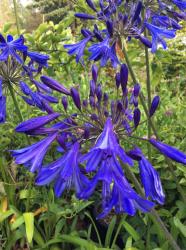
It was Barrie Coate’s discerning eye that chose this magnificent deeply hued treasure from a batch of Agapanthus ‘Mood Indigo’ seedlings when he was director of California’s Saratoga Horticultural Foundation. Promoted as the richest and darkest flowers of the genus, amazing, huge purple-laced blue globes each house up to 100 individual florets on strong, lustrous thick greenish black stalks. The nearly iridescent floral presentation roosts some 3 or 4 ft. above a large lush evergreen clump of shiny strap-like bright green leaves, which transmutes purple and red shades in winter and provides bold year-round foliar texture.
Blooms July–September
Size: 4' 0" high x 2' 0" – 3' 0" wide.
Zone 7/8.
Agastache
Lovers of heat, these tough and drought-resistant Mint family relatives guarantee terminal spikes adorned with brightly colored, tubular flowers just about all summer long. Agastaches are easily grown in well-drained soil, and will bloom more profusely, over an even longer period of time, if the flowering stems are cut back midseason.
Agastache aurantiaca ‘Apricot Sprite’ (P-1520)
OUT OF PRODUCTION AT THIS TIME
Email me when this plant is available
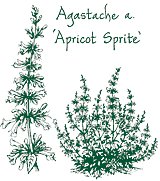
This drought tolerant bushy perennial is prized for its more manageable compact habit. With erect stems tinged a dusty grape, wine-purple calyxes, deep peachy orange flowers, and mint-scented triangular green leaves sporting silvery undersides, the stunning shades of an evening sky will light up your garden all day long. Easy-to-grow ‘Apricot Sprite’ can be planted in the company of Mediterraneans such as Geranium harveyi, where it will undoubtedly entice gardeners and hummingbirds alike.
Blooms June – mid-October
Size: 12" – 18" high x 12" wide.
Hardy to zone 7.
Agastache aurantiaca ‘Apricot Sunrise’ (P-0176)
OUT OF PRODUCTION AT THIS TIME
Email me when this plant is available
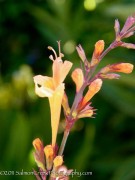
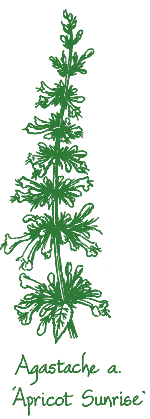
This easy-to-grow, drought tolerant perennial was hybridized by Richard Dufresne of Greensboro, North Carolina. With sinuous stems tinged a dusty grape, wine-purple calyxes, deep orange buds that fade slightly as they open, and triangular green leaves with a minty aroma and silvery undersides, the stunning shades of an evening sky will color your garden all day long. Plant with Mediterraneans or Cephalaria gigantea.
Blooms June–September.
Size: 2-1/2' high x 2' 0" wide.
Hardy to zone 7.
Agastache aurantiaca ‘Coronado TM’ (P-1560)
OUT OF PRODUCTION AT THIS TIME
Email me when this plant is available
Bees, butterflies and hummingbirds will gather around this colorful Plant Select introduction. Originally a southwestern wildflower, resilient Coronado is distinguished by highly aromatic, silver washed green leaves and sunny yellow tubular blooms set aglow with orange streaks. Tailor-made for a water wise garden, it can be situated near other undemanding cohorts like Nepeta ‘Little Trudy’ and Oenothera ‘Silver Blade’.
Blooms July – mid-October
Size: 2-1/2' high x 2' 0" wide.
Zone 5/6.
Agastache aurantiaca ‘Tango’ (P-2078)
Each $11.75
A popular 2011 introduction by Germany’s Jelitto Seeds, this spirited pollinator mainstay presents a compact, tailored foundation topped by erect, crowded spires, ablaze with lambent scarlet-
orange hues plus a smidge of violet and dusty-rose. Attractive grayish green leaves are redolent and edible, yielding a delightful anise-flavored tea. Ideal for border frontage, butterfly gardens or containers, ‘Tango’ promises easy care, months of prismatic bloom and a smaller size that can be nudged into just about any bright, well-drained cranny.
Blooms June–October
Size: 12" – 18" high x 12" – 16" wide.
Hardy to zone 5.
Agastache x ‘Black Adder’ (P-1364)
Each $11.75
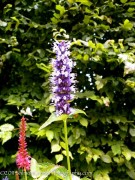
A nectar-rich magnet for hummingbirds and butterflies, long racemes of vivid blue-violet flowers unfurl from darker purple buds. Medium green foliage and straight stems support the bottlebrush-like blooms from midsummer until frost. This splendid new introduction between Agastache rugosum and Agastache foeniculum brings late season oomph and a vertical element to the mixed border or to a favored pot, while wafting a delicious licorice aroma and resisting those pesky deer.
Blooms June–September
Size: 2' 0" – 3' 0" high x 18" wide.
Hardy to zone 6.
Agastache ‘Blue Blazes’ (P-1791)
OUT OF PRODUCTION AT THIS TIME
Email me when this plant is available
You'll never regret inviting this vigorous new High Country Garden introduction to blaze its way into your favorite sun-soaked garden spot. A tall-statured enduring hybrid between Agastache 'Desert Sunrise' and the native Agastache foeniculum, 'Blue Blazes' offers gorgeous generously sized flower spikes with pinkish calyxes and glowing lavender purple blooms that yield a nonstop show for several months aloft well-groomed and fragrant, notched green leaves. Its large commanding habit can grace the middle or back of the border, where hummingbirds, butterflies, bees, and of course two-legged visitors will remain entranced.
Blooms July–October
Size: 4' 0" – 4-1/2' high x 18" – 2' 0" wide.
Hardy to zone 5.
Each $11.75
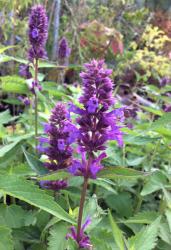
A winner at the Colorado State Perennial Trials, this vigorous new Agastache sports an upright, well-branched clumping habit shaped by stiff durable stems and large, fragrant serrated green leaves. A beacon for pollinators and superb in cut arrangements, vibrant deep violet-blue flowers pack spectacular 5 in. tall terminal spikes for months. ‘Blue Boa’ appreciates well-drained soil, wards off deer and tolerates cold weather most effectively when its stems are left standing. (pp#24,050)
Blooms June–September
Size: 2' 0" – 3' 0" high x 14" – 18" wide.
Hardy to zone 5.
OUT OF PRODUCTION AT THIS TIME
Email me when this plant is available
A beacon to hummingbirds, honeybees, and butterflies, this enthralling Jelitto introduction spotlights large long blooming spikes housing brilliant rose purple tubes with violet calyxes, held well above dark bronzy green foliage. Parented by two southwestern American species, Agastache cana and Agastache barberi, ‘Bolero’s lush leaves garb a compact, handsomely branched, licorice-scented frame, which wards off pests and endures hot, dry conditions. Place amid Kniphofia ‘Safranvogel’, Penstemon ‘Elizabeth Cozzens’ and Aster ‘Harrington's Pink’ for a prismatic soirée.
Blooms June–October.
Size: 16" high x 16" wide.
Hardy to zone 5.
Agastache ‘Danish Delight’ (P-2216)
OUT OF PRODUCTION AT THIS TIME
Email me when this plant is available
Selected by Tina Moeller in Aabybro, Denmark, this dazzling new Agastache ‘Blue Boa’ descendant struts substantial fast-growing upright stalks that are taller than its parent coupled with long-lasting plentiful reddish purple flowers, which are nearly the same color as ‘Rosie Posie’s, but much larger. Copious violet buds and dark calyces enhance the pollinator-friendly profusion of brilliant candle-like blooms, while tasteful lanceolate bright green leaves emit a pleasant licorice whiff. Appreciating protection from wet winter feet plus spring cut backs rather than fall ones, ‘Danish Delight’ energizes any well-drained, somewhat lean nook. (pp# 33,647)
Blooms July–September
Size: 2-1/2' – 3' 0" high x 18" wide.
Hardy to zone 7.
OUT OF PRODUCTION AT THIS TIME
Email me when this plant is available
This tall eye-catching Agastache is celebrated for its whorled, Salvia-like floral spikes that ignite a long-lasting fiery kaleidoscope of color. Splashed with copper, coral, pink and red hues, the sweetly aromatic tubular blooms populate numerous erect leafy stems, rising above gray-green mint-scented foliage. Parented by Agastache coccinea and Agastache rupestris and hybridized by Richard Dufresne, ‘Firebird’ blooms exuberantly, tempts butterflies and hummingbirds, plus it flavors herbal teas.
Blooms June–October
Size: 2' 0" – 3' 0" high x 18" – 2' 0" wide.
Hardy to zone 6.
Agastache mexicana ‘Red Fortune’ (P-2026)
OUT OF PRODUCTION AT THIS TIME
Email me when this plant is available
Though this flashy cultivar was originally bred for the cut flower industry, ‘Red Fortune’s saturated reddish pink blooms have also garnished salads and gardens, plus gratified pollinators. The showy, long floral wands perch above appealing, mint-scented green leaves, crafting a compact, bushy foundation, which can sojourn in a mixed border, water-wise planting or a cottage garden.
Blooms June–September
Size: 18" – 3' 0" high x 2' 0" wide.
Hardy to zone 6.
Agastache mexicana ‘Sangria’ (p-1429)
Each $11.75
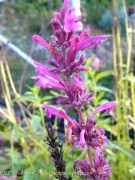
With refreshing lemon-perfumed elliptical-shaped foliage that can be brewed for tea, oodles of whorled, closely set red-purple flowers studding 12 in. tall spikes and a full upright form, tangy ‘Sangria’ can be easily tucked into your garden. A resident of northern Mexico and our very own Southwest, this Jelitto introduction is relished by hummingbirds and makes an intriguing statement alongside Eryngium amethystina.
Blooms July – October
Size: 3' 0" – 4' 0" high x 18" wide.
Hardy to zone 7.
Agastache pallida x gosa ‘Globetrotter’ (P-1363)
Each $11.75
Originally bred by the Dutch plantsman, Brian Kabbes and introduced by Jelitto Seeds in 2010, this straight-standing stalwart Agastache proudly presents showy dense spikes of pretty lilac pink flowers and purplish red bracts. The large plentiful blooms provide copious amounts of nectar and produce seeds that goldfinches adore, plus look fantastic in bouquets. Tea-worthy peppermint-scented elliptical leaves offer additional perks, while a well-drained, somewhat dry not too fertile site assures its longevity.
Blooms July–October
Size: 2-1/2' – 3' 0" high x 18" wide.
Hardy to zone 7.
Agastache ‘Pink Panther’ (P-0669)
OUT OF PRODUCTION AT THIS TIME
Email me when this plant is available
Vividly magenta, ‘Pink Panther’s flower-bedecked spires are slightly hushed by darker, earthy pink calyxes. Stems arise clad near the base in dark green, toothed, lanceolate foliage that’s washed with purple. Plant a drift of this warmly colored Agastache among Phlomis samia’s whorled mauve blooms and the coppery spikes of Kniphofia ‘Shining Sceptre’.
Blooms June–October
Size: 2-1/2' – 3' 0" high x 2' 0" wide.
Hardy to zone 6.
Agastache ‘Purple Haze’ (p-1687)
Each $11.75
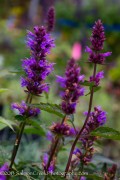
A noteworthy addition to the genus’ color spectrum, plentiful racemes weave an impressive smoky blue-violet haze upon tall firm stems and ample notched, lance-shaped green foliage that smells like anise. From July until the first frost, warm-hued 12 in. spires feature 2-lipped tubular flowers and rosy-pink calyces anchored in spaced whorls. Exceptional as a container or mixed border specimen and easily maintained by an early pinching, this hardy clump-forming Agastache keeps our interest sparked when cooler nights dress the upright stalks and dapper leaves with a deep purple infusion.
Blooms July–September
Size: 2' 0" – 3' 0" high x 2' 0" wide.
Hardy to zone 6.
Agastache ‘Rosy Giant’ (P-1504)
OUT OF PRODUCTION AT THIS TIME
Email me when this plant is available
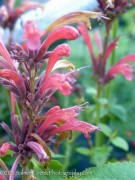
Vibrant flowers painted in rosy magenta hues and a towering stature earn this evergreen perennial its cultivar name. Staunch erect stems garnished by grayish green notched leaves with a refreshing citrus smell bolster the profuse clusters of whorled blooms and mulberry-hued calyxes.
Blooms June – mid-October
Size: 5' 0" high x 2-1/2' wide.
Zone 8/9.
Agastache rugosa var. f. albiflora ‘Alabaster’ (P-1914)
OUT OF PRODUCTION AT THIS TIME
Email me when this plant is available
A luminous white-flowering form of the Korean species, this superb cultivar has been vegetatively propagated to assure its garden-worthy status. Purple-tinged bright green leaves plus upright steady stalks promote a slew of generous, 6 in. tall, bottlebrush-like spikes with long-blooming pearly flowers and green calyces. Valued by bees, moths, hummingbirds and chefs, ‘Alabaster’ survives wet winters, demands good drainage and favors yearly pruning, while brightening perennial borders and herb gardens as well as nectaries.
Blooms July–October
Size: 2' 0" – 3' 0" high x 18" – 2' 0" wide.
Zone 5/6.
Ajuga

Bugleweed
From the Latin abigo, to drive away, Ajuga was thought to drive away disease. To some of us that disease is winter; the remedy is Bugleweed, herald of spring, with its clear blue, white or pink flowers. The crisp, crinkled foliage hugs the ground for a quick-spreading, evergreen carpet. Use Ajuga en masse under a high canopy, or to soften the hard edges of walls and paving. A moisture-retentive soil is recommended.
Ajuga ‘Chocolate Chip’ (P-1092)
Each $10.75
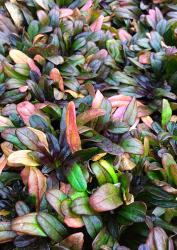
A new arrival from Italy, this unique Ajuga offers tiny, reddish chocolate-brown foliage. Spreading with vigor, the narrow lustrous leaves form a finely textured, close-knit ground cover trimmed by 6 in. tall spikes of bright blue flowers.
For a warmly colored tapestry effect, plant ‘Chocolate Chip’ en masse with Acaena ‘Purpurea’ alongside.
Blooms March–mid-May
Size: 3" – 6" high x 12" & spreading wide.
Hardy to zone 4.
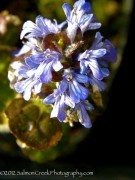
It’s not a cereal advertised on MTV, but a curious combination of metallically reflective, scrunchy purple leaves, and spikes of deep blue flowers. This one is a sound choice for tight situations, between stepping stones or in a woodland setting. A good ground cover with Viburnums.
Blooms March–early June
Size: 6" high x 12" & spreading wide.
Hardy to zone 4.
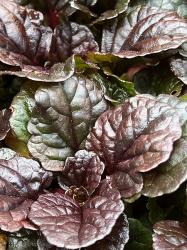
Lodged amid a flat of Ajuga reptans ‘Braunherz’, in a laboratory of all places, this plush offspring was first spotted by British nurseryman Mike Tristam in 1998. Forging a bold, peppy ground cover, broad eggplant-purple leaves—crinkled, wavy and scalloped—are burnished with a shiny veneer and mahogany highlights. The vibrant showing of violet-blue flowers alights stout upright stalks above a dense, weed smothering foundation that remains evergreen during most winters and braves heat spells, sunny locales as well as rabbits and deer. (pp#15,815)
Blooms April–June
Size: 4' 0" – 5' 0" high x 12" – 2' 0" wide.
Hardy to zone 4.
Ajuga reptans ‘Catlin’s Giant’ (P-0007)
Each $10.75
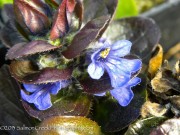
‘Catlin’s Giant’ is twice the size (and has twice the impact) of most other Ajugas. Its deep blue flower spires rise 12 in. above large, shiny bronze leaves. Let this one loose in a rock garden, or plant it under Corylopsis for an overlapping, opulent display of blooms.
Blooms March–mid-May
Size: 12" high x 12" & spreading wide.
Hardy to zone 4.
Ajuga reptans ‘Purple Torch’ (P-0225)
Each $10.75
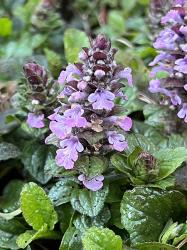
Light up your garden path with these stunning 12 in. pinkish lavender flower spikes that actually do resemble torches. Emerging from bronze winter foliage, which is followed by the fresh green leaves of spring, such color will brighten the darkest days.
For a dramatic play of colors, place the plant under Sambucus nigra ‘Black Beauty’ or near Clematis ‘Freda’.
Blooms March?mid-May
Size: 8" – 10" high x 12" & spreading wide.
Hardy to zone 4.
Ajuga tenorii ‘Emerald Chip’ (P-1245)
Each $10.75
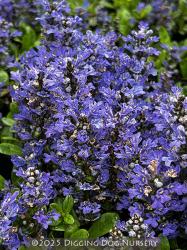
Embellished with blue pagodas, this verdurous Ajuga ‘Chocolate Chip’ sport produces a refined, low-to-the-ground emerald-green carpet of small slender leaves. Aptly named ‘Emerald Chip’ makes a gleaming well-trimmed understory for Physocarpus ‘Summer Wine’s lavish crimson-red foliage.
Blooms March–mid-May
Size: 3" – 6" high x 12" & spreading wide.
Hardy to zone 4.
Alcea
Hollyhock
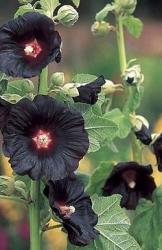
This tempting cultivar is the prized outcome of a diligent nearly 20 year-long breeding program, the Hollyhock Spotlight series, that touts superior Alcea rosea selections. ‘Blacknight’s tall truly perennial visage swaggers multiple hefty stalks with large, satiny single blossoms in dark violet to saturated ebony shades, entrancing butterflies, hummingbirds and gardeners alike.
Blooms June–October
Size: 5' 0" – 6' 0" high x 4' 0" wide.
Hardy to zone 3.
Alcea rosea ‘Polarstar’ (P-1637)
Each $10.50
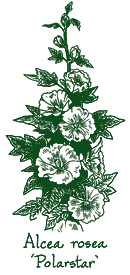
Hollyhocks are romantically old-fashioned, a compelling quintessential mainstay for the sunny cottage garden or rear of the perennial border. Lolling atop majestic upright stalks with big, round, rich green lobed leaves, an irresistible bevy of single pure white cup-shaped blooms showcase lemon-yellow eyes.
Blooms May–October
Size: 5' 0" – 6' 0" high x 2' 0" wide.
Hardy to zone 3.
Alchemilla
Lady’s Mantle
You might not transmute gold with Alchemilla, but foamy clusters of tiny star-like flowers in brilliant chartreuse will materialize above beautifully scalloped, slightly toothed foliage. A contrast of forms, Alchemilla was used to collect dewdrops in the medieval preparation of the Philosopher’s Stone. We find the way moisture collects and moves like mercury on the pale green leaves always magical. Whether fresh or dried, the flowers are a welcome addition to any bouquet.
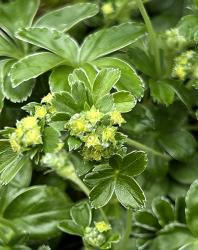
Indigenous to Greenland and Newfoundland, this snug low growing Alchemilla combines elfin charm with enduring resilience. The petite dark green leaves are distinguished by deep separate lobes, delicate silver margins and soft hairy undersides beneath a dainty effervescence of clustered chartreuse flowers perched on short stems. Touting age-old curative properties plus superb cold hardiness, Alchemilla alpina’s diminutive mound can be cozied against rocks, along paths or atop stone walls where it abides poor, lean soil but cherishes well-drained, somewhat moist niches.
Blooms June-August
Size: 6" – 8" high x 8" – 12" wide.
Hardy to zone 4.
Alchemilla ellenbeckii (P-0174)
OUT OF PRODUCTION AT THIS TIME
Email me when this plant is available
Let this low growing, wonderfully textured plant creep its way around the shaded stepping stones of your woodland garden. Let the wine red stems and miniature, sometimes silver-edged, deeply lobed and scalloped green foliage surprise you under Helleborus, Astrantia or Tricyrtis.
Blooms April–mid-August.
Size: 2" high x 12" wide.
Hardy to zone 6.
Alchemilla erythropoda (P-0009)
Each $11.25
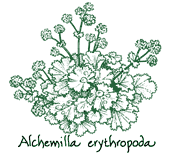
This irresistible dwarf Alchemilla sprouts gray-green serrated foliage and zesty citron-yellow flower clusters that don reddish hues once they’re spent. We plant it as a ground cover in the front of perennial borders or in small crannies of the rockery.
Blooms April–August
Size: 5" high x 10" wide.
Hardy to zone 5.
Alchemilla glaucescens (P-0010)
Each $11.25
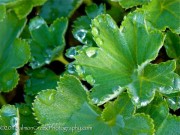
Trimmed with silver-haired teeth, shallow rounded lobes sculpt the soft-as-velvet, olive-green palmate foliage, while effervescent sprays of thirst quenching lemon-lime flowers linger above. Growing larger than Alchemilla ‘Auslese’, this Alchemilla delivers radiant appeal in dappled light amid blue flowering Brunnera.
Blooms April–mid-August.
Size: 10" high x 12" wide.
Hardy to zone 5.
Alchemilla mollis ‘Auslese’ (P-0478)
Each $11.25
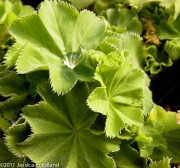
Profuse sprays of yellow-green frothy flowers adorn a mound of lush gray-green foliage, much larger than our other Alchemilla offerings. The leaves alone will enhance the foreground of any perennial border. ‘Auslese’ prefers cool moist soil, so we oblige by planting it in a woodland setting under a high canopy.
Blooms April–mid-August.
Size: 15" – 18" high x 2' 0" wide.
Hardy to zone 4.
Alchemilla mollis ‘Robusta’ (P-1685)
Each $11.75
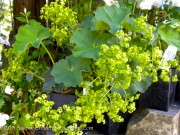
Foamy pouffes of starry chartreuse flowers carried on sturdy, mostly upright stems are a florist’s dream and a gardener’s good fortune. Rounded grayish green leaves are a little larger than the species, featuring palmate veins, minute satiny white hairs and partially folded lobes, adopting an exquisite pleated appearance. All this enchanting detail deserves a closer look, so situate ‘Robusta’ along a well-trodden path or near a favored bench where you’ll be rewarded with a repeat autumn bloom.
Blooms April–mid-July
Size: 18" high x 2' 0" wide.
Hardy to zone 4.
Allium
Ornamental Onion
Our selections are embellished versions of the common culinary bulbs. Prospering in a sunny well-drained site, these pest-resistant Alliums add flair to the garden, your favorite container and a fresh or dried arrangement.
Each $10.25
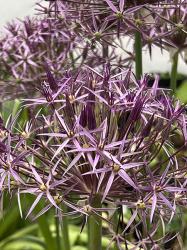
As the strap-like leaves die off, Allium christophii sends up stout stems topped by sculptural blossoms. The spherical heads, an airy array of delicate amethyst stars, span nearly 10 in., and are almost too big and too beautiful to be real. Breathtaking in borders and bouquets, Star of Persia’s fawn-colored seed heads dry perfectly. Plant a drift in a well-drained spot and surround with the enduring leafy foliage of Geranium ‘Buxton’s Variety’. This Allium withstands both deer and rodents in our garden.
Blooms June
Size: 2' 0" high x 8" – 10" wide.
Hardy to zone 4.
Each $10.25
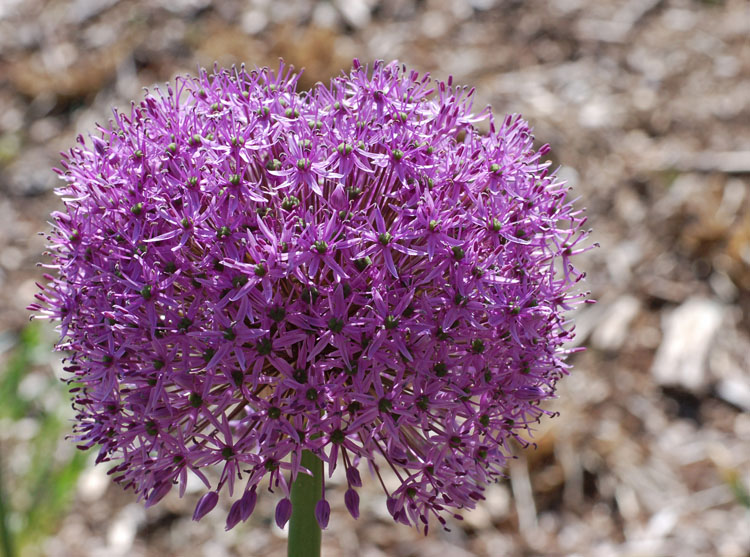
True to its name, ‘Gladiator’ is a crowd pleaser that asserts fantastic giant globes shouldered by tall hefty stems and rugged sword-shaped green basal foliage. Vibrant purple blooms, 4 to 5 in. wide, exuding a sweet yet pungent aroma, are composed of tight set green-eyed florets with a metallic lustre. A hybrid between Allium hollandicum and most likely Allium macleanii, this Allium can be staged throughout a stand of white and yellow Verbascums for spectacular colors and divergent flower forms.
Blooms May–June
Size: 3' 0" – 4' 0" high x 8" – 12" wide.
Hardy to zone 5.
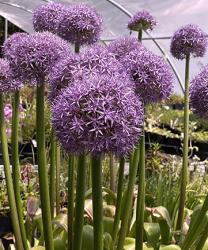
We have Jan Bijl to thank for this dazzling 1971 cross between Allium christophii and Allium macleanii. Hoisted upon staunch 2 ½ ft. tall, smooth green stalks, the gigantic densely packed orbs occasionally exceed 11 in. across, fostering a long-lasting flourish of countless star-shaped purple florets that glisten with a silver-laced metallic sheen. Adored by bees, florists and plant aficionados, ‘Globemaster’s otherworldly blooms work well when planted amid perennials such as Verbascum nigrum ‘Album’ and Alchemilla ‘Robusta’, so its strapping gray-green leaves will be hidden once they decline.
Blooms May–June
Size: 2-1/2' – 3' 0" high x 8" – 12" wide.
Hardy to zone 5.
Allium hollandicum ‘Purple Sensation’ (P-1431)
Each $10.25
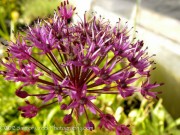
Aptly named, this ornamental Allium creates quite a stir as several hundred petite, deep purple flowers squeeze into one sensational-looking baseball-sized inflorescence. A selection made by Mr. J. Bijl in 1963 to produce a dark, vividly hued flower color, ‘Purple Sensation’ rises on tall beefy bare stems from a low nest of narrow, long twisting leaves that disappear around blooming time. Its strongly defined form can be repeated throughout the perennial border, delivering concentrated violet punches and dynamic counterpoints to softer shapes and hues, while remaining equally delightful when seed heads appear.
Blooms May–June
Size: 2' 0" – 3' 0" high x 6" – 8" wide.
Hardy to zone 4.
Each $10.75
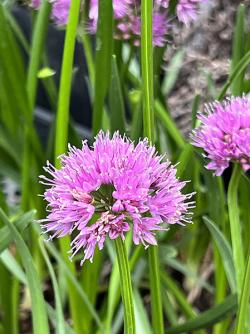
Kudos to Allium expert Mark McDonough for this sensational easily grown cultivar, which recently won the 2018 Perennial Plant of the Year award. Close-knit, slightly flattened, slender deep green leaves craft a lustrous compact clump that’s topped with vibrant rosy-mauve spheres on naked 18 in. scapes. Tantalizing butterflies and other pollinators, the profusion of showy 2 in. wide sterile blooms never reseeds and lends colorful long-lasting accents to bouquets. A supposed Allium nutens offspring, vigorous ‘Millenium’ can be situated near the front of the border, peppered amid the rockery or added to a cottage garden, where it resists deer and rabbits.
Blooms July–August
Size: 15" – 20" high x 12" – 18" wide.
Hardy to zone 5.
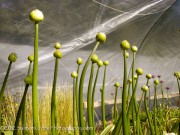
Impressive, 5 to 6 in. creamy white spheres perch atop brawny, straight, green glistening stems, evoking a snowy mountain’s majestic appeal. The tallest of the white flowering Alliums, this long blooming luminous beauty can be superimposed en masse against a dark backdrop or interplanted amid quantities of purple flowering Alliums. Coveted by gardeners, florists and bees, vigorous ‘Mont Blanc’ yields long strapping leaves persisting ‘til flowering time and is distasteful to those fretful deer.
Blooms May – June.
Size: 3' 0" – 4' 0" high x 8" – 12" wide.
Hardy to zone 4.
Allium ‘Mount Everest’ (P-1432)
Each $10.25
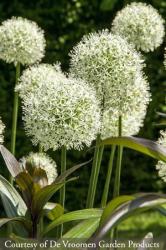
Enormous 6 in. wide snow-white globes, each densely housing up to 50 petite star-style florets with chartreuse eyes, crest tall strong stalks. Grounded by semiupright strap-shaped grayish green basal leaves, the dazzling long-lasting blooms delight pollinators, offer an intriguing dried effect and make luminous additions to cut arrangements. This carefree AGM recipient can be featured in daring sweeps as well as scattered amid Sesleria ‘Brushstrokes’ and Spodiopogon sibiricus in meadow-style plantings, dryscapes and cottage gardens.
Blooms May–June
Size: 3' 0" high x 8" – 12" wide.
Hardy to zone 5.
Each $10.25
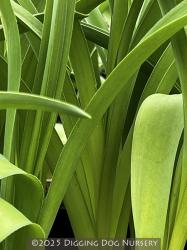
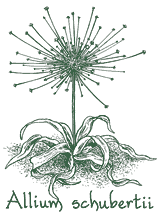
Evoking the charged energy of a bursting firecracker, some 200 miniature star-styled florets top stiff pedicels, which shoot out in all different lengths from the flower’s center. Sponsored by wavy, 1 in. wide straps and thick staunch stems, the fantastic spidery globes—enormous, loosely arranged lilac-pink wonders tailor-made for arrangements—measure at least a foot across and lay claim to their name as the entire ball eventually blows away, scattering seeds. This uniquely shaped ornamental onion’s native home is the Mediterranean and central Asia, so naturally it relishes a warm sunny niche, and when dormant, a toasty dry spell.
Blooms May–June
Size: 12" – 18" high x 8" – 10" wide.
Hardy to zone 5.
Allium senescens ‘Blue Eddy’ (P-1870)
Each $10.75
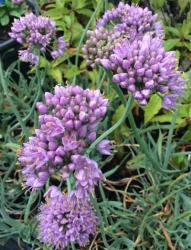
Narrow curly bluish green leaves fashion a dwarf tightset pinwheel-like rosette that evokes swirling eddies and inspires the cultivar name. Bred by onion enthusiast Mark McDonough, this unique Allium senescens var. glaucum selection serves up rounded pastel lavender pink flowers on 6 in. stems. An adaptable drought-tolerant pollinator minion, Allium "Blue Eddy" wards off deer, favors well-drained crannies, makes a lovely cut flower and can be utilized in the herb garden, amid stone work or along pathways.
Blooms August-September
Size: 8" – 12" high x 8" – 12" wide.
Hardy to zone 4.
Allium sphaerocephalon (P-1093)
Each $10.75
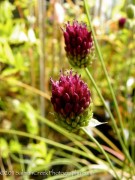
Arising from narrow grassy leaves, the tall and upright, slender stems present sumptuous thickset globes in blazon crimson-purple hues. An intriguing bicolor effect is created as green buds slowly open from the bottom up. Prized by bumblebees, the long lasting, 2 in. wide blooms assure a breathtaking summer spectacle en masse with swaths of Echinops ‘Blue Glow’ and Monarda ‘Violet Queen’ interspersed.
Blooms July–August.
Size: 2' 0" – 2-1/2' high x 5" wide.
Hardy to zone 5.
Allium ‘Summer Beauty’ (P-2028)
Each $10.75
Favored by pollinators and plant purveyors, ‘Summer Beauty’ begets plenteous, large lavender-pink pompoms balanced atop sturdy, 20 in. tall stems. The upright strap-like leaves distinguish a neat polished green basal mound that announces fall with golden highlights. Full of long-lived vim and vigor, this sterile Allium can be ushered into the rockery or a patio pot so its sprightly pastel-hued accents can be relished all summer long.
Blooms June–August
Size: 18" – 2' 0" high x 12" – 18" wide.
Zone 4/5.
Aloe
A rosette of fleshy leaves and eye-catching terminal panicles roosting on long scapes hallmark this diverse genus of undemanding drought tolerant succulents. Asking only for sharply drained soil and protection from too much winter cold, Aloes make topnotch container subjects and highly ornamental additions to any garden, especially when associated with Crocosmias, Cistus or Melianthus ‘Antonow’s Blue’.
Aloe ‘Johnson’s Hybrid’ (P-1605)
Each $12.50
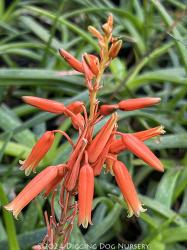
Bright orange, pendulous tubes, each yellow on the inside and fringed in green, compose densely arranged, flashy-looking racemes perched on erect, one foot tall stems nearly all year long. With tiny white teeth and irregular light speckles, the narrow, bright green tapered leaves arch up and out, sculpting a dense, matlike ground cover. This diminutive South African Aloe can withstand cool winter temperatures and musters alluring contrast when sited amid Euphorbia ‘Blue Haze’ in the rockery.
Blooms March–October.
Size: 2' 0" high x 2' 0" & spreading wide.
Hardy to zone 8.
Alstroemeria

Peruvian Lily
These stunning plants add an exotic touch to the border and a refined look to any flower arrangement with their elaborate blend of vivaciously colored and intricately marked flowers. The Lily-like blooms are borne in large heads above bushy spreading clumps of linear foliage. Thriving in well-drained soil, Alstroemerias need protection from intense sun and extreme winters. Mulch heavily in colder areas or try planting in a container, bringing them into a cool garden room for the winter.
Alstroemeria ‘Casablanca’ (P-0815)
Each $17.75
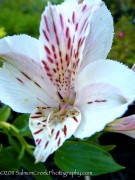
Many Alstroemerias have made claim to being white, but few have made the mark. Clearly, ‘Casablanca’ comes the closest. Inside its loose white flower clusters, a wash of yellow sets off cinnabar dashes, while a pale pink swath enhances light green lines on the flip side. Grand in more ways than one, ‘Casablanca’ stands taller than most of our Alstroemeria offerings.
Blooms June–August
Size: 3' 0" – 4' 0" high x 2' 0" & spreading wide.
Hardy to zone 8.
Alstroemeria ‘Champagne’ (P-1601)
Each $17.75
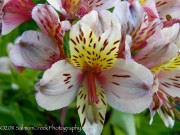
Sporting a vigorous stately habit and a floral display similar to ‘Casablanca’s, ‘Champagne’ is distinguished by elegant blossoms that entertain an antique-toned creamy color. Merlot etchings on the inner petals and rosy patches on the backs of the light-hued outer petals further embellish the easy-to-blend blooms.
Blooms June–August
Size: 3' 0" – 4' 0" high x 2' 0" & spreading wide.
Hardy to zone 8.
Alstroemeria ‘Compact Red’ (P-1203)
Each $17.75
Procured nearly 20 years ago, this seldom offered Alstroemeria is more stunning than its name might imply. Alluring cherry red blossoms with dark maroon dashes and bright blond inner splotches sojourn on a compact bushy mass of short leaf-lined stalks.
‘Compact Red’ maintains its upright stance and is well-suited for a container or the frontlines, surrounded by other richly rubescent bloomers like Kniphofia ‘Nancy’s Red’, Sanguisorba ‘Red Thunder’ and Monarda ‘Jacob Klein’.
Blooms June – August
Size: 18" – 2' 0" high x 2' 0" & spreading wide.
Hardy to zone 8.
This exquisite white-flowering cultivar arose from a years-long breeding program initiated by French horticulturist Jean-Pierre Turc. Proffering a pollinator-friendly display for nearly 6 months, the plentiful white flowers reveal pink and green splashes contrasted with snazzy claret-hued bars above a low-growing lush foundation of erect stem and linear, 3 in. long, pointy green leaves. ‘Duchess d’Anjou Beatrice’s pearlescent flowers make luminous additions to wedding bouquets, while her snug diminutive guise appreciates appropriate winter shelter and readily rules smaller-sized recesses, cutting gardens or courtyard pots.
Blooms June–September
Size: 12" – 20" high x 18" & spreading wide.
Zone 7b/8.
Alstroemeria ‘Dusty Rose’ (P-0284)
Each $17.75
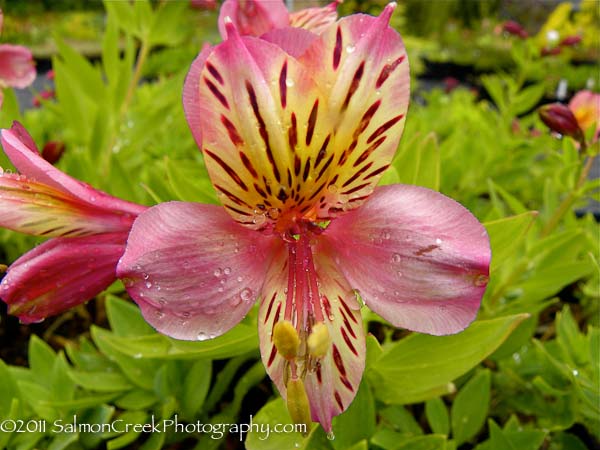
Blushed with a medley of lovely old-fashioned pinks, this beauty came to us from a U.C. Davis college professor years ago. Its jungle-like foundation of handsome foliage culminates in rose-hued flowers warmed by butter-yellows, creamy streaks and dark wine-colored markings. Claret brush strokes and just a hint of green engrave the petals’ exterior.
Blooms June–August
Size: 2-1/2' high x 2' 0" & spreading wide.
Hardy to zone 8.
Both a florist shop’s darling and a star in the garden, ‘Henry’s Violet’ struts dandy bicolored blooms. Vivid violet-hued outer petals reveal white throats with burgundy flecks, a chartreuse dusting, flaxen highlights and several prominent magenta-laced purple blotches. Sturdy long stems and a flood of fresh green foliage support the large open-funneled flowers that cavort amid Stachys ‘Hummelo’, Salvia ‘Whirly Blue’ and Kniphofia ‘Minister Verschuur’ above our stonewall.
Blooms June–August.
Size: 3' 0" high x 2' 0" & spreading wide.
Hardy to zone 8.
Alstroemeria ‘Inca Rio®’ (P-2318)
Each $17.75
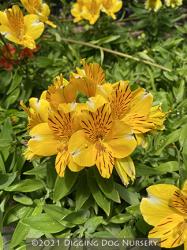
A sunny burst of copious butterscotch-hued blooms shines above slim, somewhat curvy, medium green foliage. Heightened by rouge-colored dapples, maroon dashes and mahogany backsides, the long-lasting flowers lend ebullient accents to border frontage, cottage gardens, patio pots plus cut arrangements. This dapper Alstroemeria’s compact low-growing habit is perfect for space-thrifty plantings, where it enjoys adequate moisture, good drainage and moderate fertility.
Blooms June–August
Size: 12" – 16" high x 15" – 18" wide.
Zone 7b.
Alstroemeria ‘Inticancha Kanika’ (P-2330)
Each $17.75
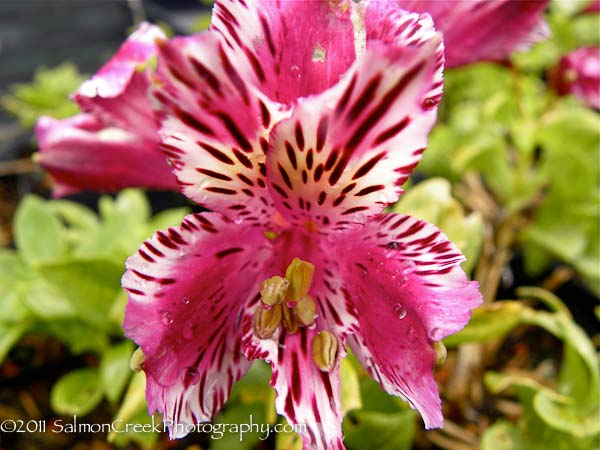
Highlighted by orchid pink, lilac and rose colors, and boldly patterned with numerous wine-colored dashes, the bright white petals of this Alstroemeria will leave you spellbound. Superimpose against a dark green hedge or plant amid white flowering Francoa sonchifolia and Gaura ‘So White’, and a memorable sight is yours for the viewing!
Blooms June – August
Size: 2-1/2' high x 2' 0" & spreading wide.
Hardy to zone 8.
Alstroemeria majestic ‘Layon’ (P-2218)
Each $17.75
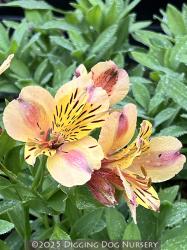
Boasting a compact tailored habit, improved winter hardiness and a generous long-lasting floral fete, this sunshine-colored beauty is a recent member of the Majestic series from breeder Turcieflor in the Loire Valley of France. Firm stems clothed in lusty lance-shaped green foliage bolster the ample terminal clusters of funnel-shaped canary-yellow blooms with rose-colored blushes plus burgundy striations, which serve as nectar-guides for beneficial pollinators. Loose well-drained soil, regular dead-heading and adequate winter protection around 10° ensure ‘Layon’s good health and bountiful blossoms.
Blooms June–September
Size: 2-1/2' – 3' 0" high x 2' 0" & spreading wide.
Zone 7b.
Alstroemeria ‘Marjorie’s Hybrid’ (P-0603)
Each $17.75
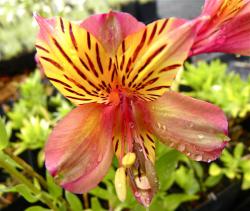
Ample Lilyesque blooms feature a cozy mingling of dusty mauve, blushed salmon and sunburst gold areas peppered with wine-colored bars. Shouldered by plucky broad green leaves, ‘Marjorie’s Hybrid’s floral coloration is softer than ‘Third Harmonic’s, rendering it an amiable companion for silver-foliaged plants and yellow, pink, blue or purple-hued flowers.
Blooms June–August
Size: 2-1/2' high x 2' 0" & spreading wide.
Hardy to zone 8.
A lusty presentation of shiny green foliage anchors large abundant clusters of rose pink blooms, flaunting a decidedly feminine aspect. Pink and green tubular buds unfurl flared trumpets, which emphasize chartreuse bands on the outside and on the inside, a rosy mauve cast with lightly blushed patches, burgundy markings and delicate dark feathering along the edges.
Blooms June–August
Size: 2-1/2' high x 2' 0" & spreading wide.
Hardy to zone 8.
Alstroemeria ‘Princess Victoria’ (P-0489)
Each $17.75
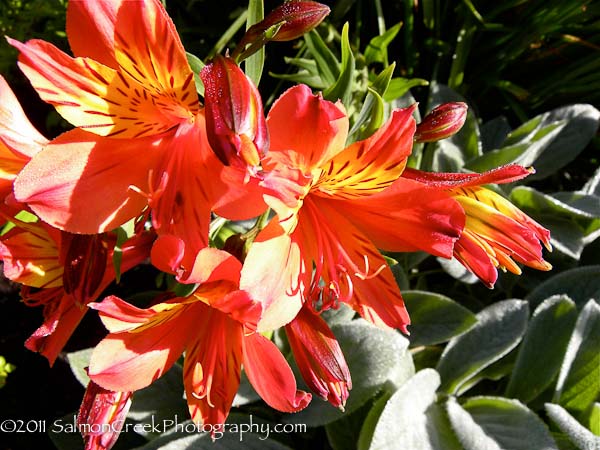
Awash in saturated, deep coral pinks and canary yellows, ‘Princess Victoria’ celebrates a spirited flowery affair. Salmon-tinged petals are darkened by dusty-rose shades on the backside and set aglow inside by 2 orangey pink-tipped upper petals painted with sunshine hues and small crimson striations. Guaranteed to charm, this Alstroemeria’s lush, medium green base is a soothing counterpoint to its fanciful flowers.
Blooms June–August
Size: 2-1/2' high x 2' 0" & spreading wide.
Hardy to zone 8.
Alstroemeria ‘Princess Fabiana’ (P-2197)
Each $17.75

Hats off to Holland’s Van Zanten Plants for this exceptional low-growing variegated sport of ‘Princess Daniela’. Adorned with burgundy streaks and the softest yellow swath on the inside plus chartreuse and rose-colored dapples on the flip sides, countless creamy-white blooms sojourn above petite lance-shaped green leaves that sport perky porcelain-hued margins. Unhampered by heat and humidity, the snug tailored mound projects sparkling panache in a patio container, atop a rock wall or along a pathway. (pp#17,991)
Blooms June–August
Size: 10" – 12" high x 18" & spreading wide.
Hardy to zone 8.
Alstroemeria ‘Princess Lilian’ (P-2220)
Each $17.75
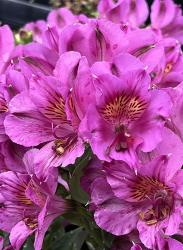
This new Dutch-based Royal Van Zanten introduction peacocks a gregarious burst of big funnel-like magenta-purple blooms heightened by flaxen-colored swaths with maroon dashes on the inside and chartreuse brushstrokes on the outer petals. Popular amongst gardeners short on space, flower arrangers and butterflies, her prismatic flowers top a low-growing lush bushy mound that emphasizes strong stems plus snug lance-shaped green leaves. ‘Princess Lilian’ can hold court in patio containers or small planting beds, and along pathways or atop walls, where she promises to turn quite a few heads.
Blooms June–September
Size: 10" – 14" high x 18" & spreading wide.
Hardy to zone 8.
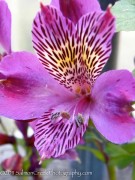
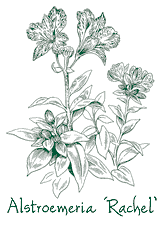
A prized outcome from the late Fred Meyer’s efforts to improve upon a group of European Alstroemeria hybrids, ‘Rachel’ is named after former nursery owner Judy Wigand’s granddaughter, and is renown for her tidy, compact stature and pretty purple blooms. Eye catching lemon-yellow shades give a sunny lift, while snazzy maroon dashes and dark violet splotches enhance the good-sized flower clusters.
Atop a short and shiny, thickset foliar clump that’s quite hardy, the sumptuous orchid shades look especially boisterous when matched with other Alstroemerias such as ‘Yellow Friendship’ and ‘Princess Victoria’.
Blooms June – August
Size: 2' 0" high x 2' 0" & spreading wide.
Hardy to zone 8.
Alstroemeria ‘Red Valley’ (P-1689)
Each $17.75
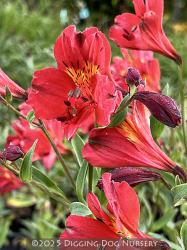
A passionate drama is played out when this cultivar’s seductive blooms unfurl in sassy shades of bright red with scarlet overtones. Staged above thick, ribbed green foliage, the bold floral presentation is heightened by cocoa-colored streaks amid primrose-yellow splashes on the upper petals. ‘Valley Red’ produces flowers that are far more sultry than ‘Princess Victoria’s and makes a sublime companion for reddish chocolate-leafed Eupatorium ‘Chocolate’.
Blooms June–August
Size: 2-1/2' high x 2' 0" & spreading wide.
Hardy to zone 8.
Alstroemeria ‘Third Harmonic’ (P-0563)
Each $17.75
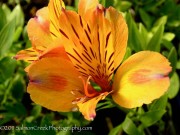
Aptly named, ‘Third Harmonic’ showcases a harmonious union of lavish color, resonating in gilded saffron, sunflower yellow, peach and dusky orange, while darker tints shade the tips and underside of each petal. Deep maroon bars impose a lively pattern on the warm-hued flower clusters that alight verdant leafy stems.
Blooms June–August
Size: 3' 0" – 3-1/2' high x 2' 0" & spreading wide.
Hardy to zone 8.
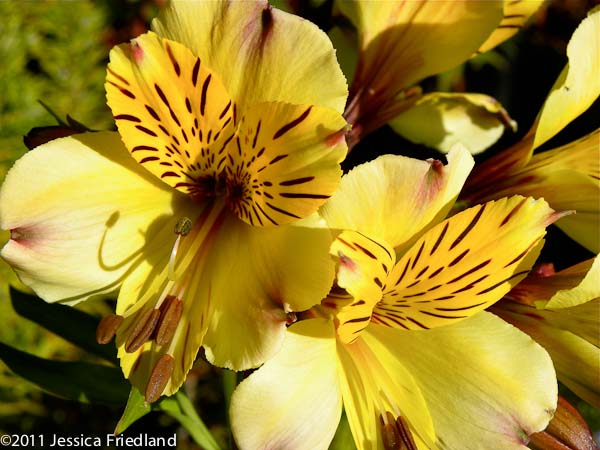
Always on the lookout for a cheerful yellow-flowering Alstroemeria, we were delighted to find this exceptional cultivar at Wisley Botanical Gardens outside of London. The blooms are golden-yellow inside, decorated with striking burgundy lines, while the outer petals are like a watercolor sunset, each with a deep purple blotch plus pink and mauve tones that fade toward the tips.
Blooms June–August
Size: 3' 0" high x 2' 0" & spreading wide.
Hardy to zone 8.
Each $11.50
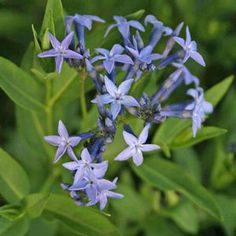
Springing forth in a seedling block of Amsonia tabernaemontana at Sunny Border Nursery, this energetic compact perennial has an unresolved lineage, with some speculating that either Amsonia montana or Amsonia orientalis may be a parent. What’s for certain is the fact that its flowers are the bluest, most vibrant and longest blooming ones amongst the genus. The pyramidal-shaped terminal clusters of navy-colored buds and starry lavender-blue blooms garnish a refined dense mound clothed in narrow, willow-like dark green leaves. ‘Blue Ice’s easily maintained habit beams brilliant yellow fall color, looks its best when massed and makes a spiffy deer-proof addition to rock work, borders or woodland peripheries.
Blooms May–June
Size: 12" – 18" high x 2' 0" wide.
Hardy to zone 4.
Each $10.75
Too long ignored, this hard-to-find perennial adds pleasing texture to the border and delicacy to a bouquet. In early summer, bushy clumps of elegant, upright stems are crowned with steel blue buds and starry gray-blue flowers held in graceful umbels.
We are especially captivated by the willowy needlelike leaves, which eventually burnish to a brilliant gold, and together with the persistent chocolate-hued seed heads, bestow a rich autumn show. A southwestern U.S. native, Blue Star is undemanding and long-lived in any garden soil.
Blooms June–July
Size: 2' 0" – 3' 0" high x 3' 0" wide.
Hardy to zone 4.
Anchusa
Italian Bugloss
Anchusa azurea ‘Loddon Royalist’ (P-1686)
Each $12.25
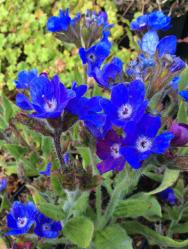
“Of deep glorious color” are the words Graham Stuart Thomas, legendary author and horticulturist, uttered to describe the deep blue tint, vividly imbuing large, edible forget-me-not like blooms, and deeming ‘Loddon Royalist’ the bluest of them all! Selected more than 50 years ago at Britain’s Loddon Nursery, this garden-worthy Borage family member and Mediterranean denizen sprouts a stubble-surfaced dark green basal rosette below infamous white-ringed dimple-centered blossoms, which perch on lax stems and make a tasty culinary garnish. Verbascum ‘Sixteen Candles’ and Geum ‘Prinses Juliana’ are glowing companions for the ever-blue floral wonders, while light sandy or sharp-draining soil plus a shearing right after the flowers have faded will ensure its long-lived vigor.
Blooms May–June
Size: 2-1/2' – 3' 0" high x 12" – 18" wide.
Zone 3/4.
Each $11.25
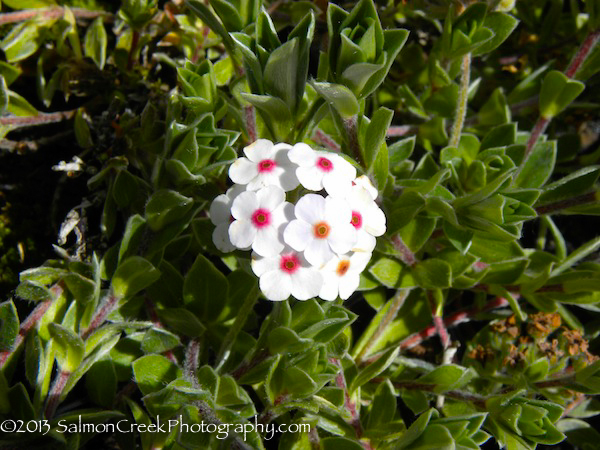
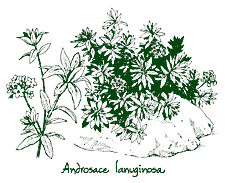
Named for its soft-looking ovate silver-green leaves, this mounding evergreen Himalayan native cascades profuse umbels of delicate pink and white florets, with both crimson and green eyes, over rocks, steps and garden walls. Trailing reddish shoots and a faint sweet smell enhance the allure of a duet with Lavandula ‘England’.
Blooms June–September
Size: 6" high x 18" wide.
Hardy to zone 5.
Anemone
Wind Flower
“The floure never openth it selfe, but when the wynde bloweth,” wrote William Turner, in A New Herbal (1560). In our garden, however, we enjoy the buttercup-shaped flowers in any weather, windy or not. Tasteful and deceptively delicate looking, Anemone is also tough and undemanding. Most will multiply readily in rich sandy loam, and are perfect for naturalizing in a woodland setting.
Anemone Fantasy ‘Snow Angel’ (P-2163)
Each $11.75
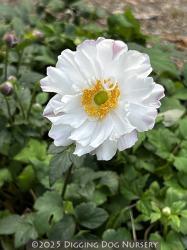
Centered by ebullient yellow stamens, a flurry of semidouble snow-white flowers prances above trim, compact rich green leaves. The layered, lucent petals plus peppy green foundation create a fresh classic style that earns Snow Angel a front row seat in formal borders, as well as pollinator plantings, cottage gardens and even cut arrangements. (pp#31,802)
Blooms August-mid October
Size: 18" – 2' 0" high x 18" – 2' 0" wide.
Hardy to zone 6.
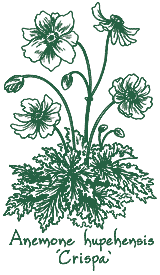
Reminiscent of triple curled parsley, the striking green leaves are embellished with curious curves, crinkles, ruffles and red-tinged margins. In autumn, 2 ft. tall stalks present delicate, 3 in. wide pale pink flowers, centered by shaggy yellow eyes, above an ultra-textured mound, which is more compact and less spreading than other hupehensis cultivars. Though there’s some confusion about its origins, this unusual British selection may be ‘Lady Gilmour’, an age-old cultivar first recorded in 1895.
Blooms mid-August–September
Size: 20" – 2' 0" high x 2' 0" wide.
Hardy to zone 4.
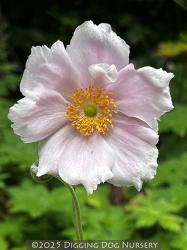
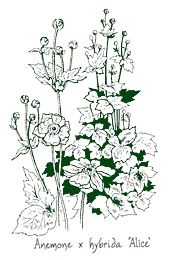
Unlike many Anemones, ‘Alice’ spreads slowly, growing into a clump 3 ft. across within 3 years. It is robust and upright with large leaves that outsize the foliage of most hybrida forms. In our garden, the semidouble soft pink flowers appear to float against a hedge of Carpinus and contrast well with the yellow fall foliage of Amsonia hubrichtii.
Blooms late August–October
Size: 5' 0" – 6' 0" high x 3' 0" wide.
Hardy to zone 4.
Anemone x hybrida ‘Andrea Atkinson’ (P-0911)
Each $11.75
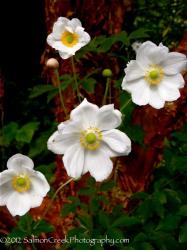
These beauties sway on tall but sturdy stems above lush deep green Maple-shaped leaves. Downy green buds open into semidouble white flowers with chartreuse eyes. In winter, seed heads turn a cozy chocolate-brown, making ‘Andrea Atkinson’ an entertaining addition to drifts or borders. For vivacious color, try it with Phlox ‘Blue Paradise’, Tricyrtis or blue-flowering Geraniums.
Blooms August–late October
Size: 4-1/2' – 5' 0" high x 3' 0" wide.
Hardy to zone 5.
OUT OF PRODUCTION AT THIS TIME
Email me when this plant is available
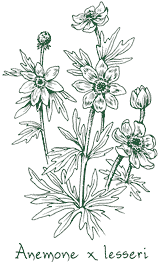
This lovely jewel-box-like hybrid affords cupped carmine-red blooms, festooned with spry yellow anthers above an attractive non-aggressive bed of low growing ferny green foliage. Parented by Anemone multifida and Anemone sylvestris, Anemone x lesseri’s fine cut palmately lobed leaves and uniquely colored up-facing flowers make compelling additions to the rockery, an open woodland planting or a border’s front lines. Appreciative of morning light accompanied by dappled afternoon shade on hot days, its dwarf habit requires minimal care, resists those meddlesome deer and prospers in moist well-drained organic-rich soil.
Blooms June
Size: 12" – 15" high x 9" – 12" wide.
Hardy to zone 5.
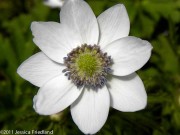
This exquisite Chinese denizen presents refined single white flowers with a smoky halo of deep blue-violet stamens, which surround green centers, and mauve-flushed backsides. An illuminated choice for shady alcoves, Anemone leveillei’s low mound of deeply palmate and hirsute dark green leaves can be massed amid ferns and wild gingers in humus-enriched soil.
Blooms April–early June
Size: 15" – 18" high x 18" wide.
Hardy to zone 5.
Each $11.75
This little-known endearing Anemone hosts uniquely etched, oval-shaped pale green buds and dainty, cupped, 1 in. wide soft yellow flowers followed by decorative, fluffy white seed heads on erect leafy stems. The appealing, somewhat reflective evergreen mound of lobed, fine-hewn deep green foliage is easily grown and well-suited for the front of a border with good drainage and moderate water.
Blooms July–October
Size: 12" high x 10" wide.
Zone 7/8.
Anemone multifida ‘Annabella White’ (P-2221)
Each $11.75

A low-laying ferny mound of finespun green foliage and firm, somewhat fuzzy, upright stems lift the enchanting cupped white blooms. Selected from the North American native Anemone, ‘Annabella White’ keeps our interest sparked as abundant seed heads appear looking a bit like unripe strawberries, then later morph into a fluffy dove-gray mop. This compact undemanding perennial lends lovely accents to the rockery, a cottage garden, alpine planting or naturalized meadow, where it thwarts deer, looks most effective en masse and enjoys average well-drained soil with adequate moisture.
Blooms May–June
Size: 10" – 20" high x 10" – 12" wide.
Hardy to zone 3.
Beloved since debuting in William Robinson’s 1883 book, “The English Flower Garden”, this charming spring treasure champions large creamy grayish-blue buds and chalice-shaped lavender-blue flowers garnished with broad rings of golden stamens atop short upright stalks. Linear, deeply toothed segments sculpt the handsome dark green foliage, which leaps from fibrous mat-forming rhizomes and later goes summer dormant. Bestowed a well-earned AGM, ‘Robinsoniana’ is tailor-made for broad sweeps either as an easy-care woodland filler or a pest-free ground cover beneath shrubs like Spirea or Pieris. Dappled light to deep shade plus fertile, well-drained and slightly acidic soil help it fend off deer, bunnies and dry summer conditions.
Blooms March–May
Size: 6" high x 10" – 12" wide.
Hardy to zone 4.
Anemone nemorosa ‘Vestal’ (P-1607)
OUT OF PRODUCTION AT THIS TIME
Email me when this plant is available
Adored by all who behold it, this charming European woodland plant boasts the choicest double Wood Anemone flowers in cultivation. Six ray petals, pure as the driven snow, encompass a fluffy white central tuft of distinctively gathered petaloid stamens. The elegant, long lasting 1 in. blooms repose upon low ferny mats of ephemeral spring leaves that show off a purplish sheen when young and disappear come summer.
Blooms late March–early May.
Size: 4" high x 12" wide.
Hardy to zone 4.
OUT OF PRODUCTION AT THIS TIME
Email me when this plant is available
Brilliant citrine-yellow petals swirl around golden stamens, their sunny coloration rare for an Anemone. Often tinged red on the outside, the good-sized, saucer-shaped flowers are presented on slender, leafless 6 in. stems above a handsome basal mat of glossy deep green foliage. A southwest European native, this spreading Anemone prefers a sunny, well drained bank where its cheerful blooms can be paired with blue flowering Nepeta reichenbachiana.
Blooms May–June.
Size: 12" high x 8" wide.
Hardy to zone 6.
Anemone rivularis ‘Glacier’ (P-1745)
Each $11.75
Native to the far reaches of Himalaya, India and Ceylon, this Anemone quickly emerges in the spring as an attractive basal clump of long-petioled deep green trilobed leaves. Red-tinged stems–silky, stiff, arching and branched–deliver snow white droves of large, open saucer-shaped flowers. Violet-blue anthers and backsides with dusty green and gun-metal blue streaks enhance the exquisite blooms, while spiky green seed heads gathered in ornamental clusters provide autumn allure. Unparalleled in drifts, ‘Glacier’ insists on cool, moist humus-rich soil.
Blooms June–August.
Size: 16" – 20" high x 12" wide.
Hardy to zone 4.
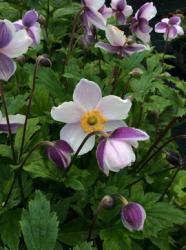
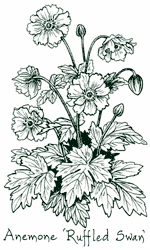
Hats off to the highly acclaimed Scottish Elizabeth MacGregor Nursery for this exceptional hybrida and rupicola cross. The tallest of the Swan series, ‘Ruffled Swan’ fashions large semidouble icy-white flowers dressed with ruffled margins, frilly golden centers and violet-blue undersides. The perfect-for-cutting sterile blooms look elegant all summer long above 3-lobed green leaves that produce a trim vigorous clump, favoring free-draining, evenly moist accommodations. (PPAF)
Blooms July–mid-October
Size: 2' 0" – 2-1/2' high x 18" wide.
Hardy to zone 6.
Each $11.75
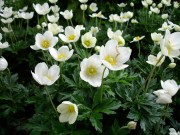
With Old World appeal, its sweet smelling bounty of yellow-eyed, satiny white blossoms has been lighting up gardens for over 400 years. Atop straight 18 in. stems, delicate cup-shaped single flowers offer a repeat bloom come fall, and later develop ornamental cotton-like seed heads. Deeply cut, palmate green leaves form a lustrous dense ground cover that easily naturalizes in loamy soil and bright shade. Amenable to full sun where its cool and full shade where it’s warm, this ethereal beauty detests desert heat, can accompany early-flowering spring bulbs and may periodically need its energetic rhizomes curbed.
Blooms April–June & September
Size: 12" – 18" high x 12" – 18" wide.
Hardy to zone 4.
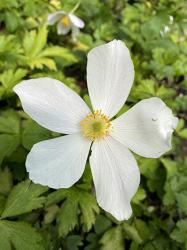
Granted the prestigious plant of the year award at the Chelsea Flower Show in 2011, this wildly popular Anemone gives you good reason to swoon. Superb in bouquets, a long-lasting plethora of large snowy blooms with lavender-blue flip sides presents peerless panache atop slender stems and low growing, deeply divided dark green foliage. ‘Wild Swan’s well-mannered, noninvasive habit can be massed in a woodland garden or tucked amid rock work where its flowers close at dusk, resembling nodding bells. (pp#23,132)
Blooms June–September
Size: 18" high x 18" – 2' 0" wide.
Hardy to zone 6.
Angelica
Angelica
Imparting a strong sculptural presence, these selections are 3-year biennials that thrive in moderately moist well-drained spots. If you cut the blooms before the seed sets, you might be rewarded with flowers for 3 or even 4 years.
Angelica archangelica (P-0827)
Each $10.50
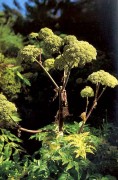
The floriferous namesake of St. Michael the Archangel, who is supposed to have revealed its power to battle the plague, Angelica archangelica’s luxuriant, tropical-looking foliage makes a dramatic entrance each spring as leaves unfurl to a length of 2 to 3 ft. Flower buds of mauve, strikingly set against its deeply divided bright green verdure, herald the imposing lime-tinted white flowers surmounting thick, erect stalks. This Angelica’s aromatic young shoots have long been used as a flavoring in sweet confections.
Blooms August–September.
Size: 5' 0" high x 4' 0" – 5' 0" wide.
Hardy to zone 4.
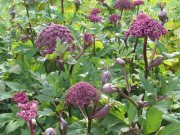
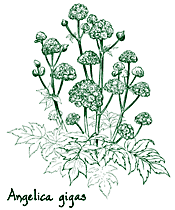
Painted in vivid tones of deep plum, the round buds open into extraordinary domed flowers that reach an astonishing 8 in. across and, set against burly, freely branching burgundy stems plus vigorous green foliage, possess a dark magnetism. Give this Korean native plenty of room as it rockets skyward. Penstemon ‘Blackbird’ provides an echo of bloom color while delivering vertical contrast.
Blooms August–September
Size: 4-1/2' – 5' 0" high x 2-1/2' wide.
Hardy to zone 5.
Each $10.50
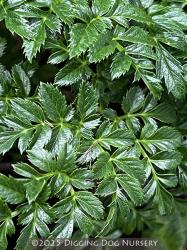
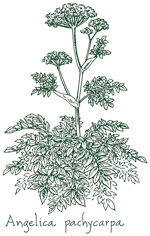
The sizable rounded mound of this Angelica‘s lustrous dark green foliage looks like a parsley plant on steroids. Endemic to New Zealand, its copious deeply fingered leaves offer handsome deer resistant support to the fanciful and fragrant snowy umbels that crown strong stalks. Growing as an undemanding somewhat short-lived perennial, but offering up seedlings as a consolation, Angelica pachycarpa‘s bold leaves bring fantastic architecture to a good-sized con- tainer or the border, especially when grouped with Actaea, ‘Brunette’ or Anthriscus ‘Ravenswing’.
Blooms April–June
Size: 3' 0" high x 3' 0" wide.
Hardy to zone 5.
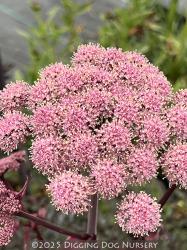
While the species traipses throughout Europe and Eurasia’s roadsides, meadows and riverbanks, this impressive, yet slightly shorter cultivar can be invited into the moist loamy corners of your garden. The enormous pale pink umbels surmount towering, straight, dark reddish purple stalks and pinnate maroon-infused leaves sporting sawtooth-serrated margins. A mainstay for flower arrangers, honeybees and garden visitors,‘Vicar’s Mead’s robust biennial profile is exemplary for the back of the border where it lends bold yet lacy accents, plus readily reseeds.
Blooms June–July
Size: 4' 0" – 5' 0" high x 2' 0" – 2-1/2' wide.
Hardy to zone 4.
Anthemis ‘Susanna Mitchell’ (P-1096)
Each $11.25
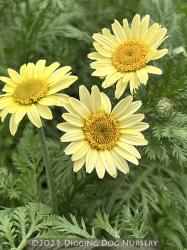
Named after the English plantswoman who discovered it, this robust, yet graceful chance seedling provides a soothing place for the eye to rest. The low silver-green mound of finely feathered foliage looks decorative even before the many, many gold-centered, creamy yellow daisies appear. In harmony with the foliage, the versatile long blooming flowers pale to alabaster tones, mixing easily with hot or cool color schemes.
Blooms June–September.
Size: 2' 0" high x 3' 0" wide.
Hardy to zone 6.








